Tools Required
| • | SA9105E Engine Support Bar Assembly |
| • | SA91112T Axle Seal Protector |
| • | SA9132S Lower control Arm Ball Stud Separator |
Removal Procedure
- Position the vehicle on a hoist.
- Remove the air cleaner and duct assembly. Refer to Floor Air Outlet Replacement .
- Disconnect the negative battery cable from battery.
- Remove the hold-down retaining nut and screws, and lift off battery hold-down retainer.
- Lift the battery out of vehicle, and place in a safe location.
- Disconnect the PCM J2 (black 28-way) harness connector by moving locking device outward toward fender.
- Remove the PCM attachment bolts and move PCM out of way.
- Remove the battery tray bolts and tray.
- Remove the transaxle strut-to-midrail bracket fastener.
- Loosen the transaxle strut to transaxle bracket fastener and flip the transaxle strut out of the way.
- Disconnect all electrical connectors from the transaxle.
- Remove the vent tube retaining clip if equipped.
- Remove the top 2 clutch housing-to-engine bolts. Automatic shown, manual similar.
- Disconnect the spark plug wires from coil towers.
- Disconnect the electrical connectors at the electronic ignition module.
- Remove the bolts from electronic ignition module. Remove electronic ignition module.
- Remove the shifter cables from shift arms and from clutch housing. Use care not to damage cable boot.
- Rotate the clutch slave cylinder 1/4 turn counterclockwise while pushing into the clutch housing. Remove the cylinder from the housing.
- Remove the two clutch hydraulic dampener to clutch housing fasteners. Wire the actuator cylinder and the dampener to the upper radiator hose.
- Wire the radiator to the upper radiator support to hold the radiator in place when frame is removed.
- Install the SA9105E .
- Place the engine support bar in vehicle as shown. Place the support bar feet on the outer edge of the shock tower.
- Connect the bar hooks to engine support brackets.
- Position the stabilizer foot on engine block to the right of the engine oil dipstick.
- Adjust the hooks and stabilizer to remove looseness.
- Raise the vehicle and drain transaxle fluid.
- Remove the front wheels.
- Remove the left and right front inner fender splash shields.
- Remove the front engine splash shield from the vehicle.
- Remove the engine strut frame bracket-to-frame fasteners.
- Remove the transaxle mount-to-frame fastener.
- Remove the front exhaust pipe-to-manifold fasteners.
- Remove the front exhaust pipe-to-catalytic converter nuts.
- Remove the exhaust pipe support bracket-to-exhaust pipe fasteners.
- Remove the front exhaust pipe from the vehicle.
- Remove the steering gear to frame fasteners. Power steering gear shown, manual steering gear similar.
- Support the steering gear with safety wire.
- Remove the brake pipe bracket push pin at rear of frame.
- Remove the engine to transaxle stiffening brace bolts and remove the brace.
- Remove the dust cover to clutch housing bolts and remove the dust cover.
- Remove the cotter pin from lower ball joints and discard. Loosen nut and back off until top of nut is even with top of threads.
- Separate the ball joint from lower control arm using the SA9132S and remove the nut.
- Repeat for the opposite side.
- Separate the left side axle from the transaxle using a large screwdriver or appropriate pry bar.
- Remove the axle only part way and install SA9112T . Use the seal protector that was previously used or open up the protector at split line and install around axle and into seal. This will protect the seal from being cut by the shaft spline.
- Separate the right side axle from the intermediate shaft.
- On DOHC (LL0) vehicles, remove the intake bracket to intake manifold bolt.
- Remove the intake bracket to intermediate shaft support bolt, and remove the support bracket.
- Remove the 2 intermediate shaft to the engine block bolts.
- Carefully slide the intermediate shaft out of the transaxle.
- Use the powertrain support dolly and two 4 in x 4 in x 36 in pieces of lumber to support the frame on the dolly.
- Remove the 4 frame-to-body bolts.
- Support the transaxle securely with a jack.
- Remove the 2 bottom clutch housing to engine bolts, and install the guide bolt into bottom rear clutch housing bolt hole.
- Separate the transaxle from the engine and lower the transaxle.
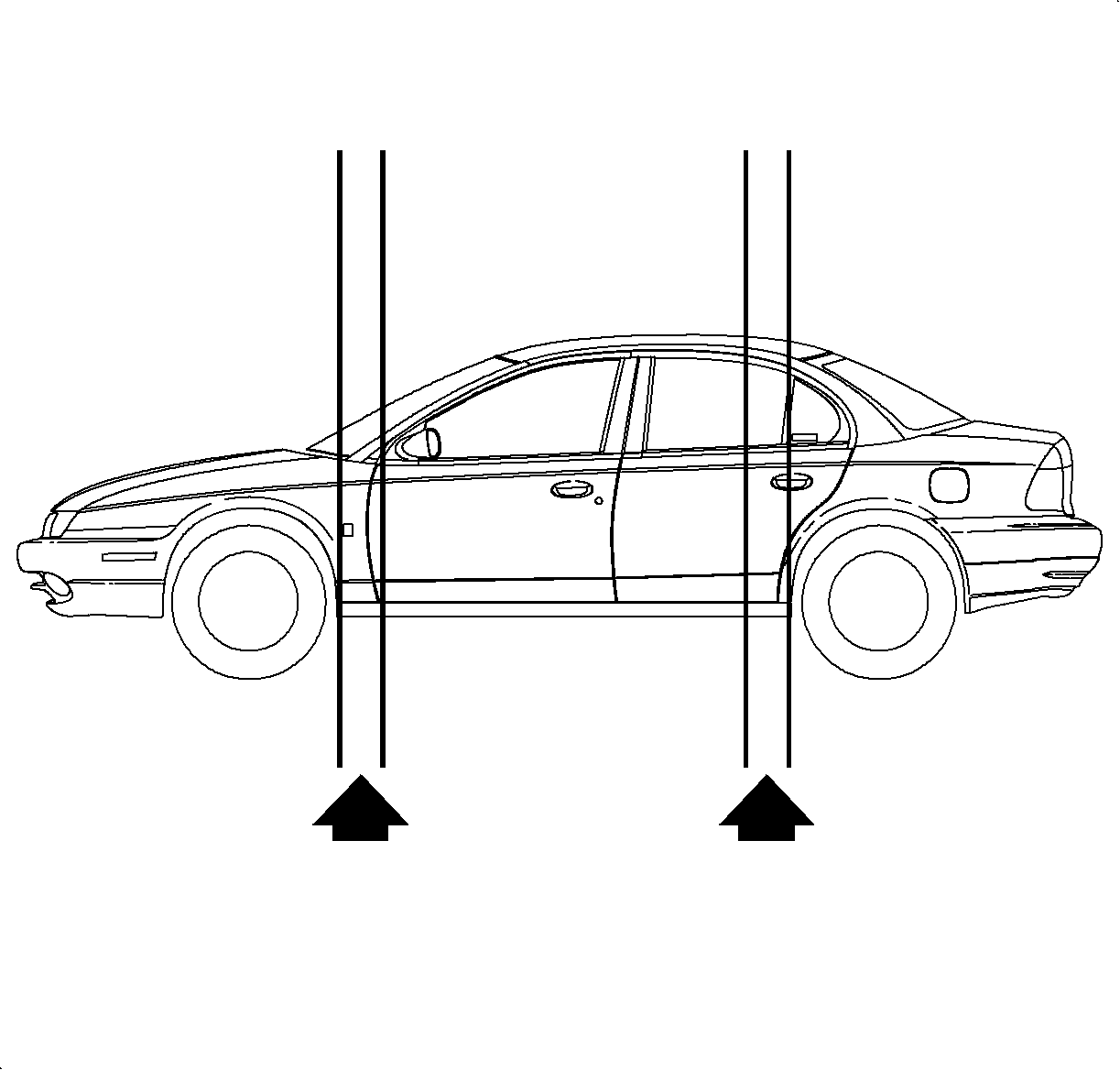
Caution: Ensure that the vehicle is properly supported and squarely positioned. To help avoid personal injury when a vehicle is on a hoist, provide additional support for the vehicle on the opposite end from which the components are being removed.
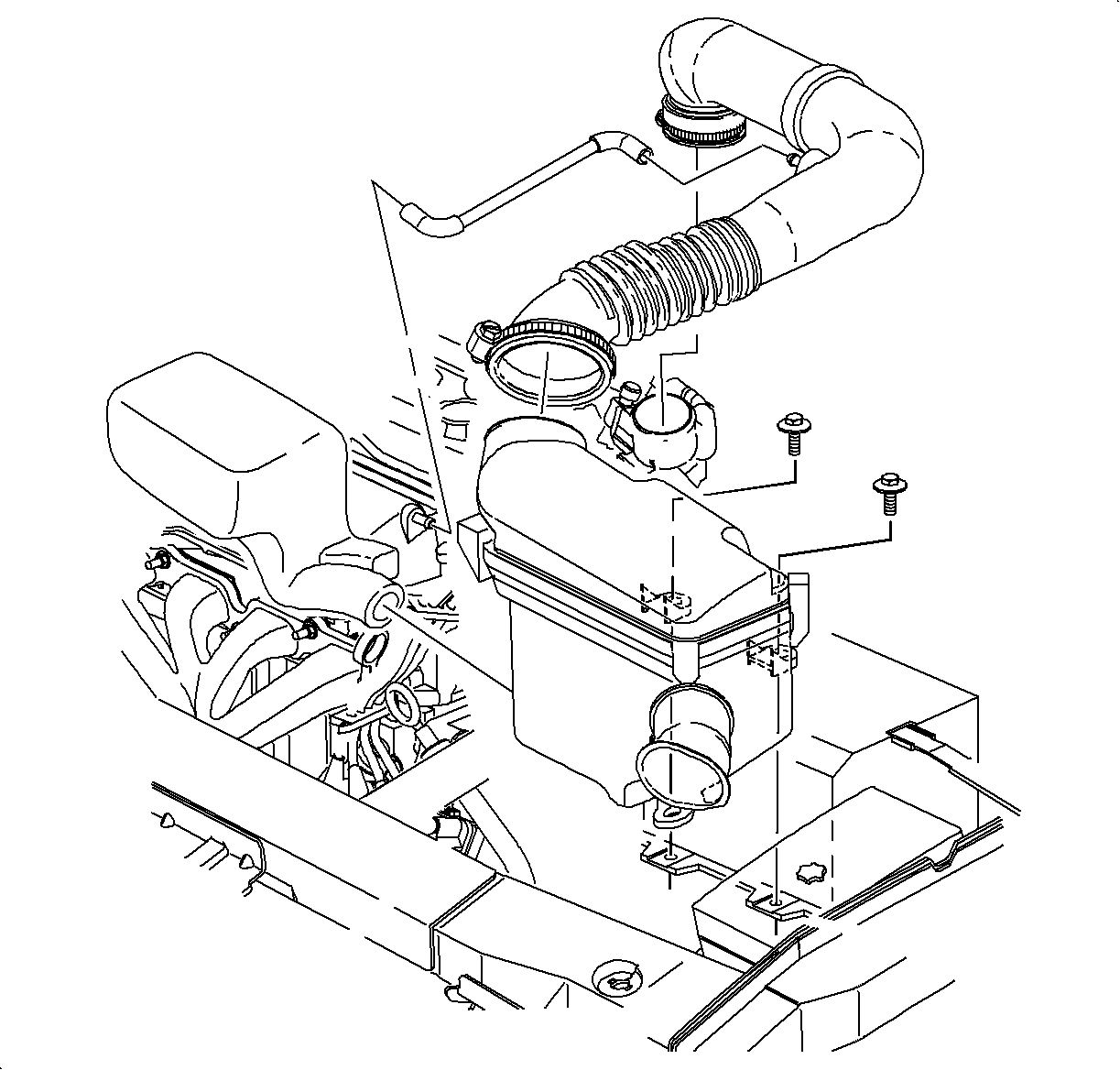
Caution: Refer to Battery Disconnect Caution in the Preface section.
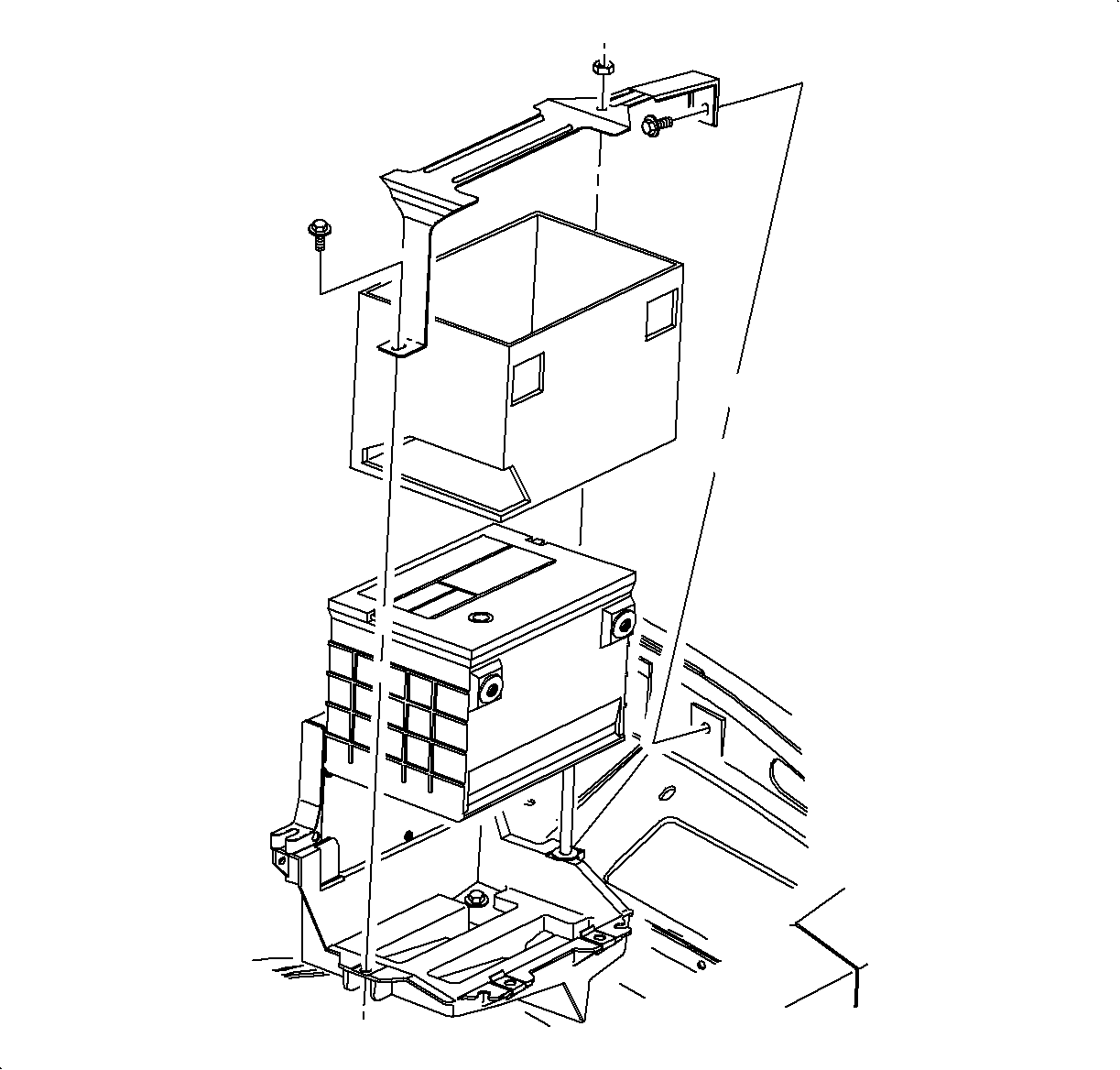
Disconnect the positive battery cable from battery.
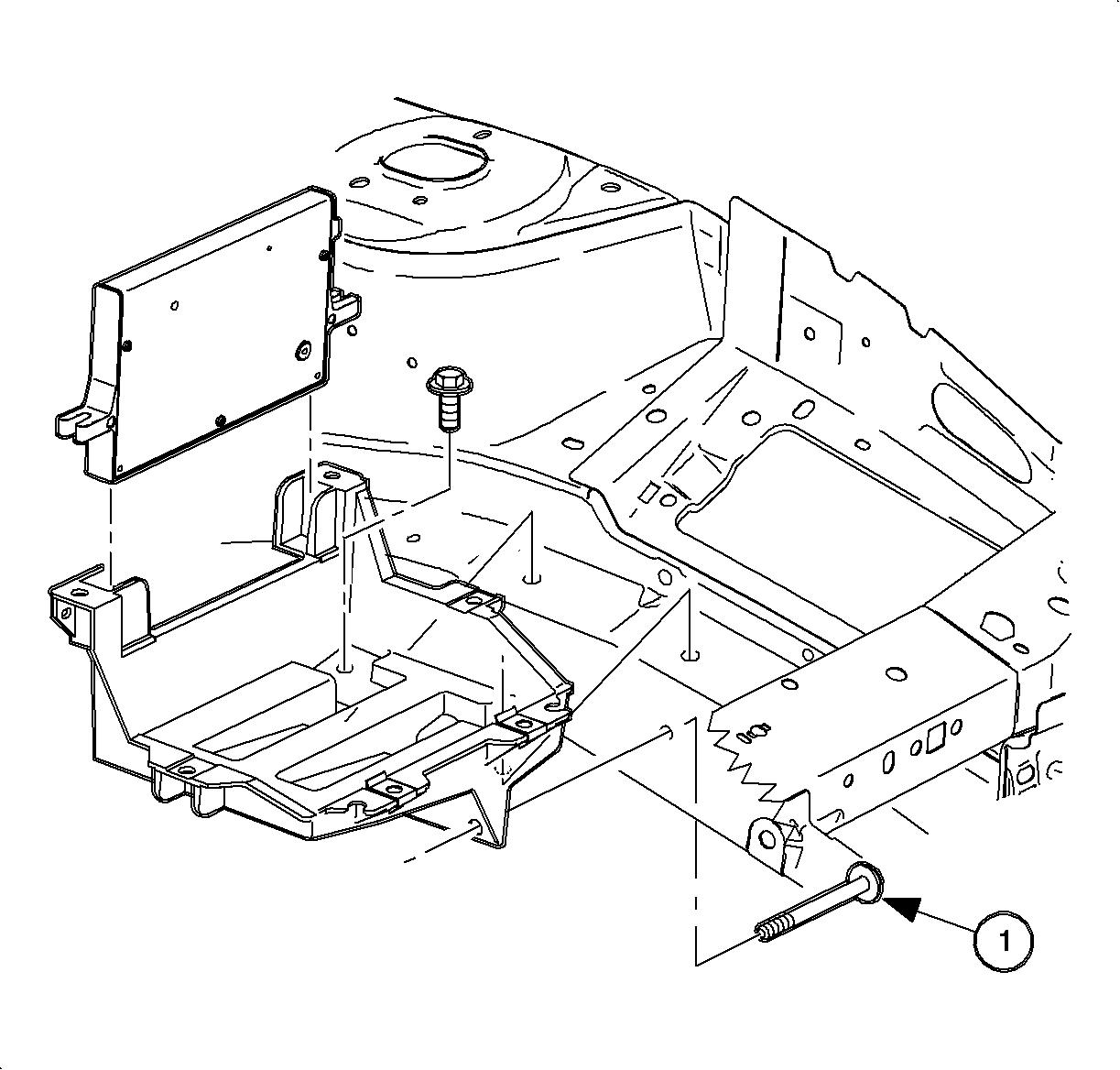
Important: The PCM J1 (black 80-way) harness connector does not need to be disconnected.
One bolt is located in the fender well.
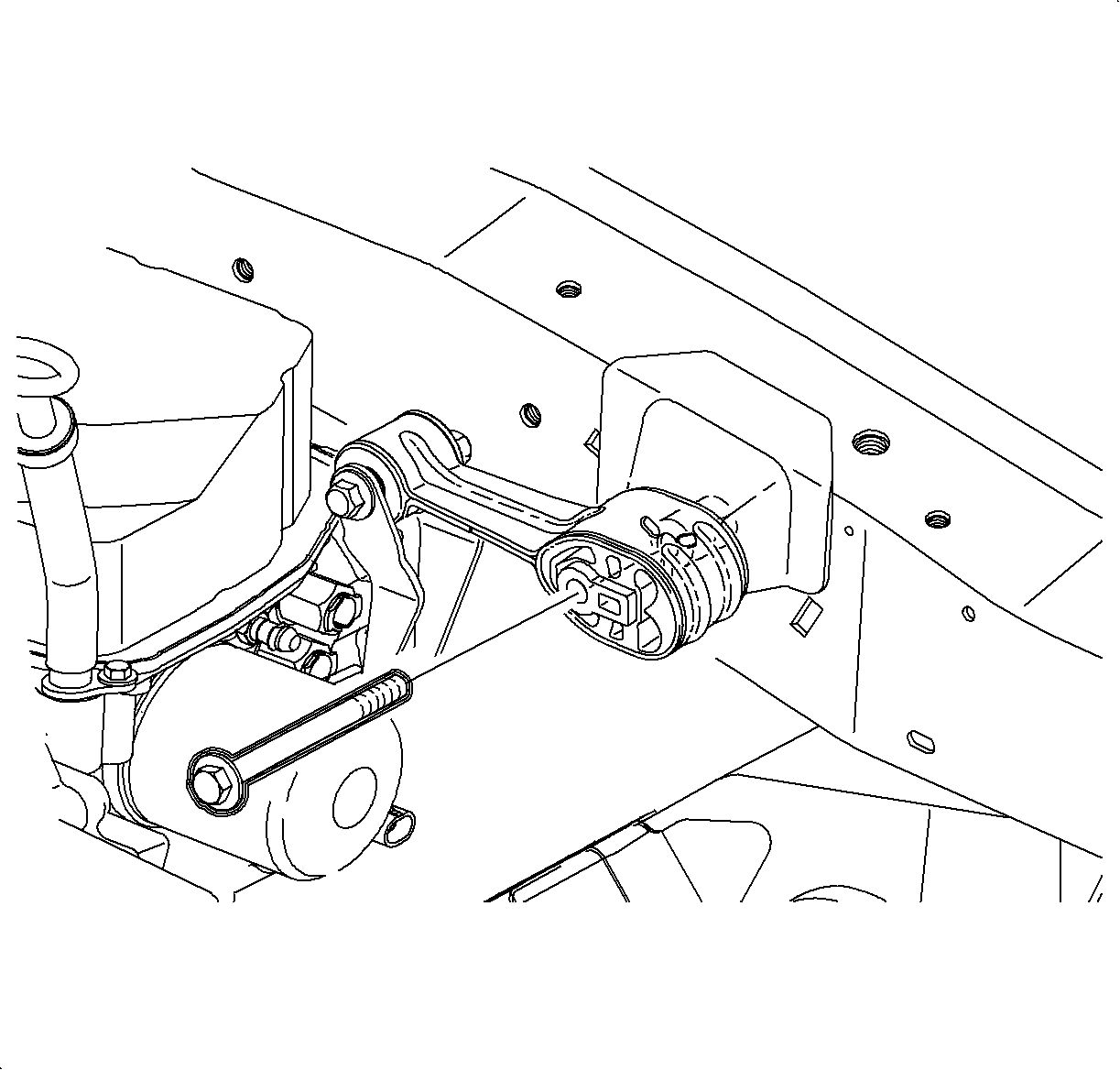
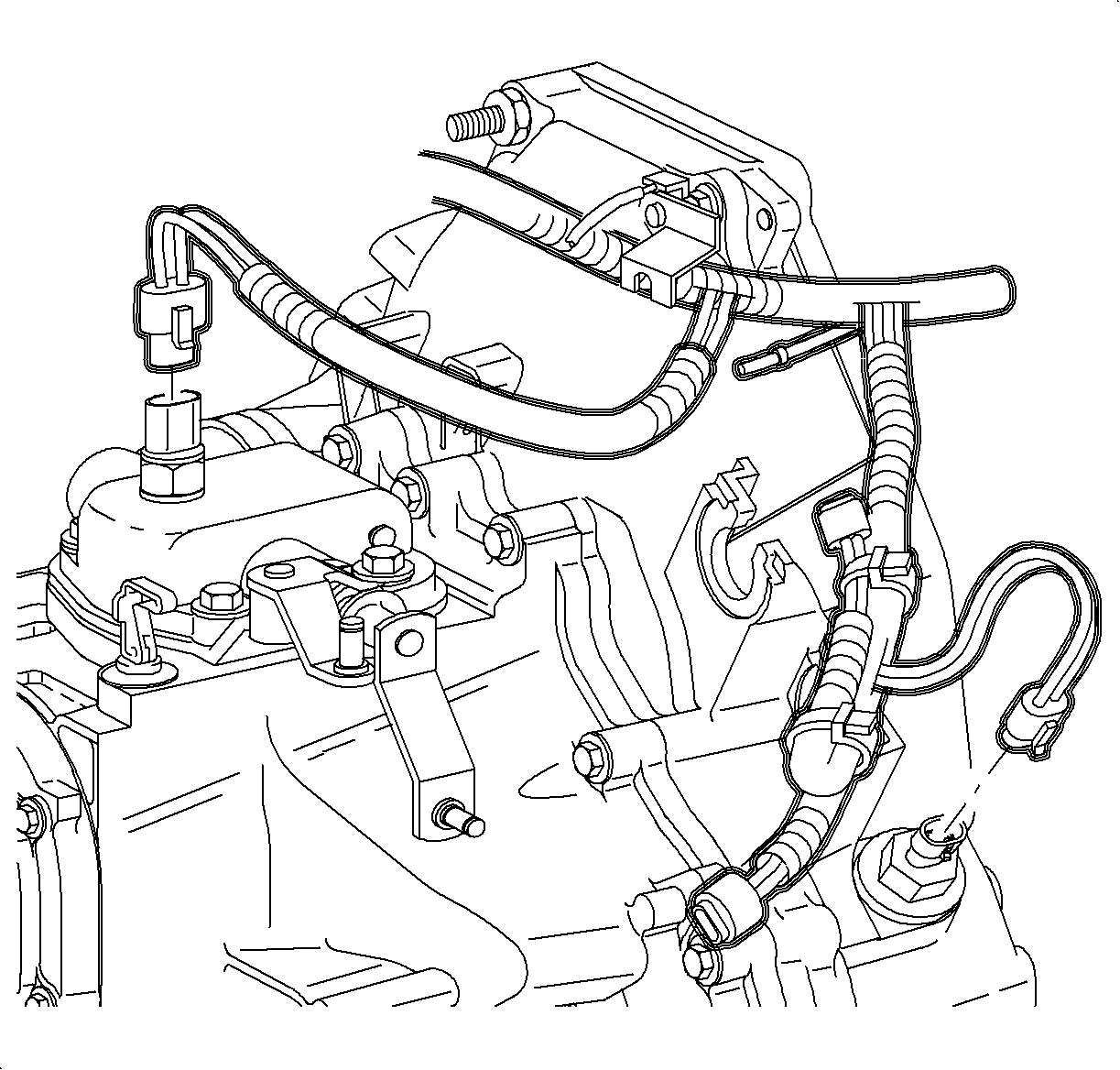
| • | Back-up lamp switch |
| • | Vehicle speed sensor |
| • | Two ground terminals from top 2 clutch housing bolts |
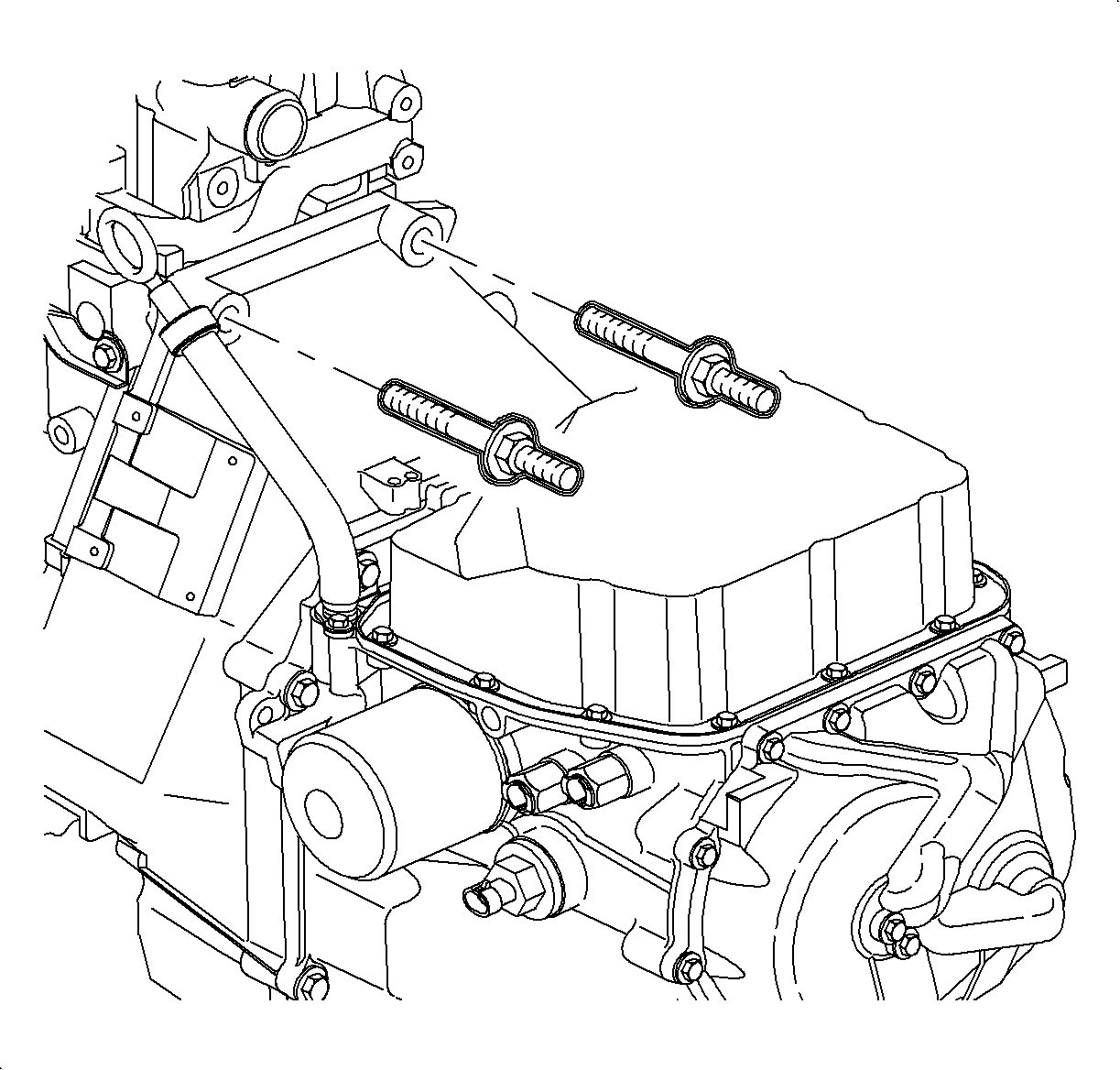
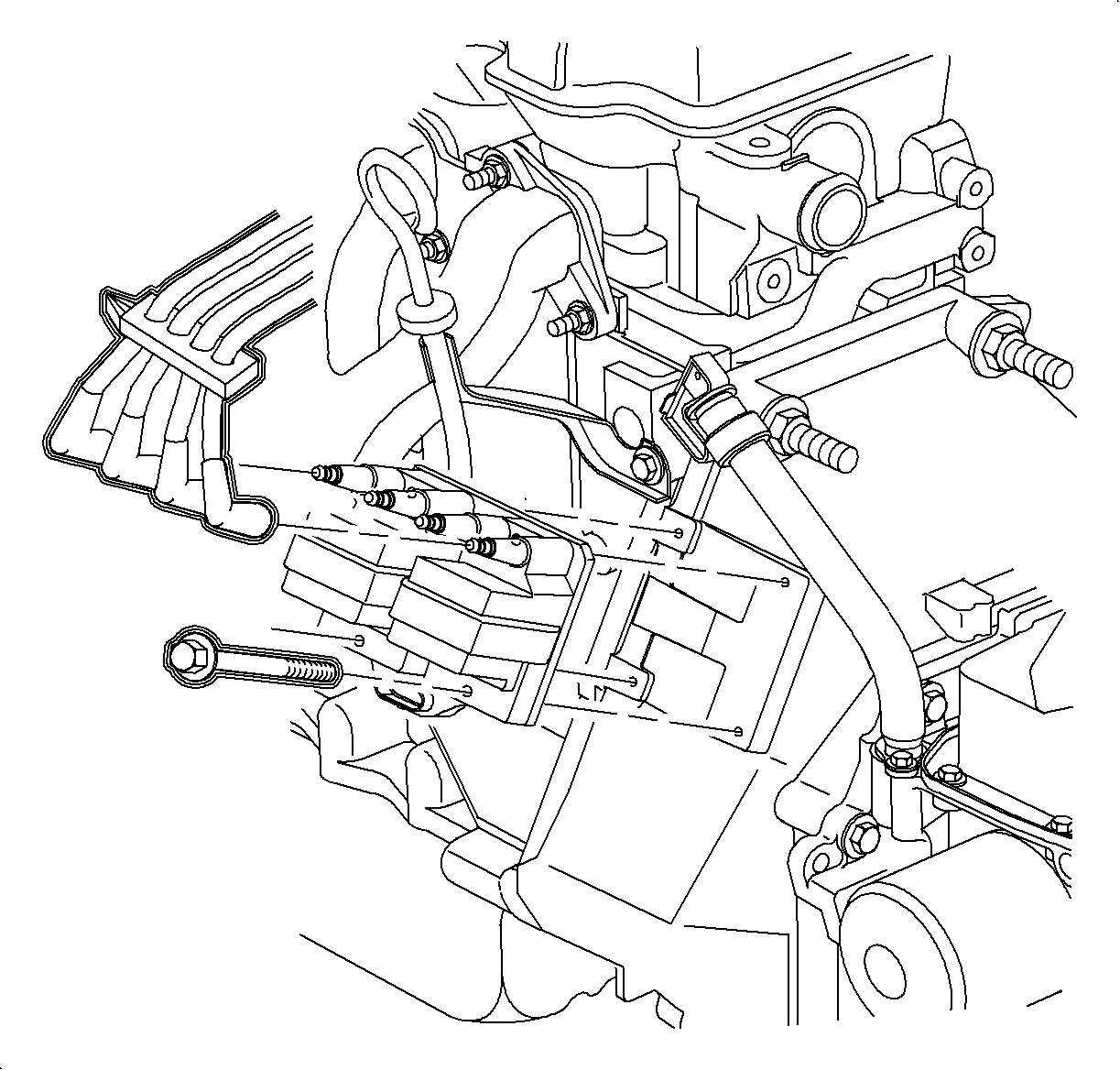
Important: Note which spark plug wire is removed from which coil tower. The spark plug wires must be connected to the correct coil towers.
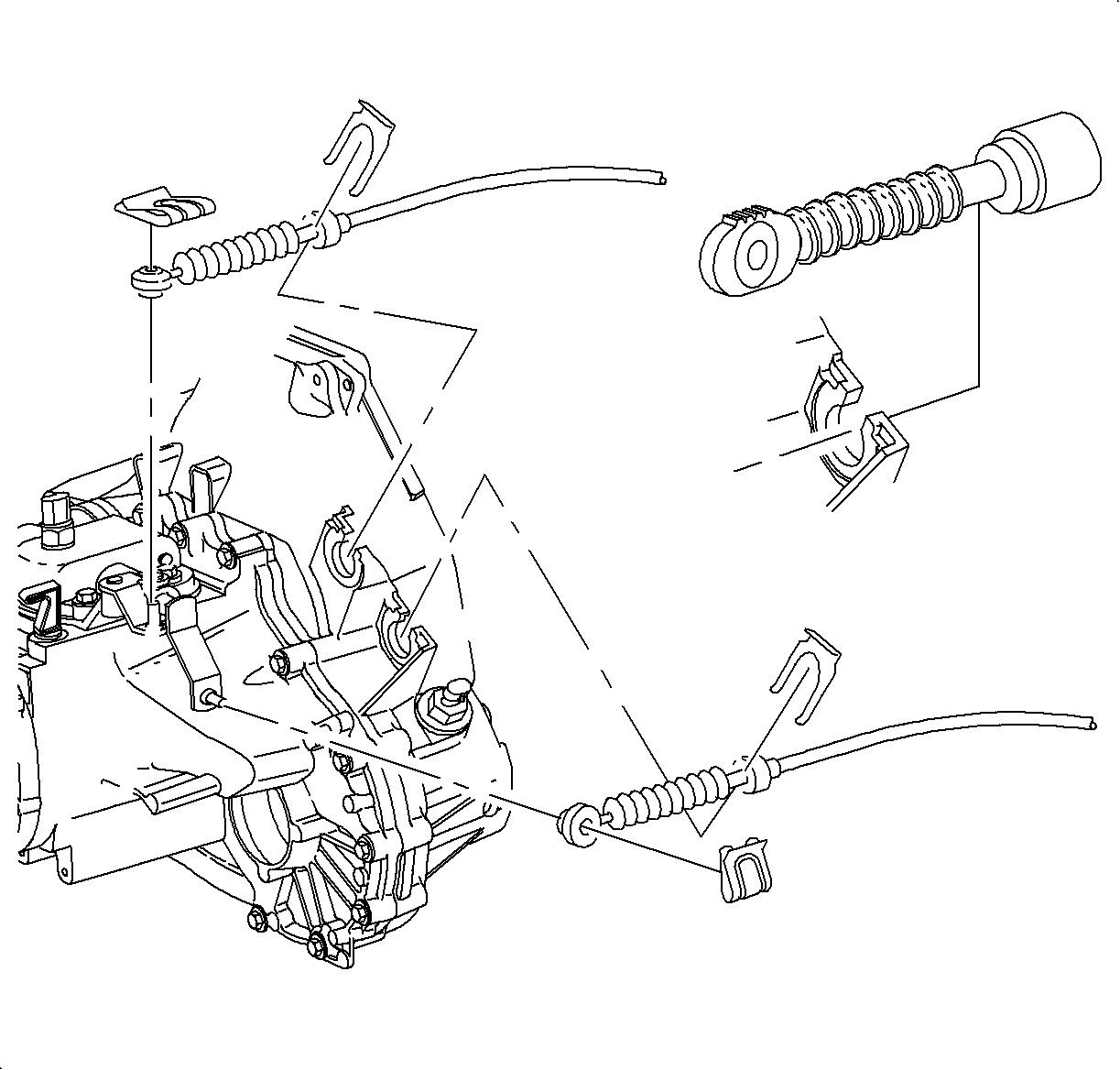
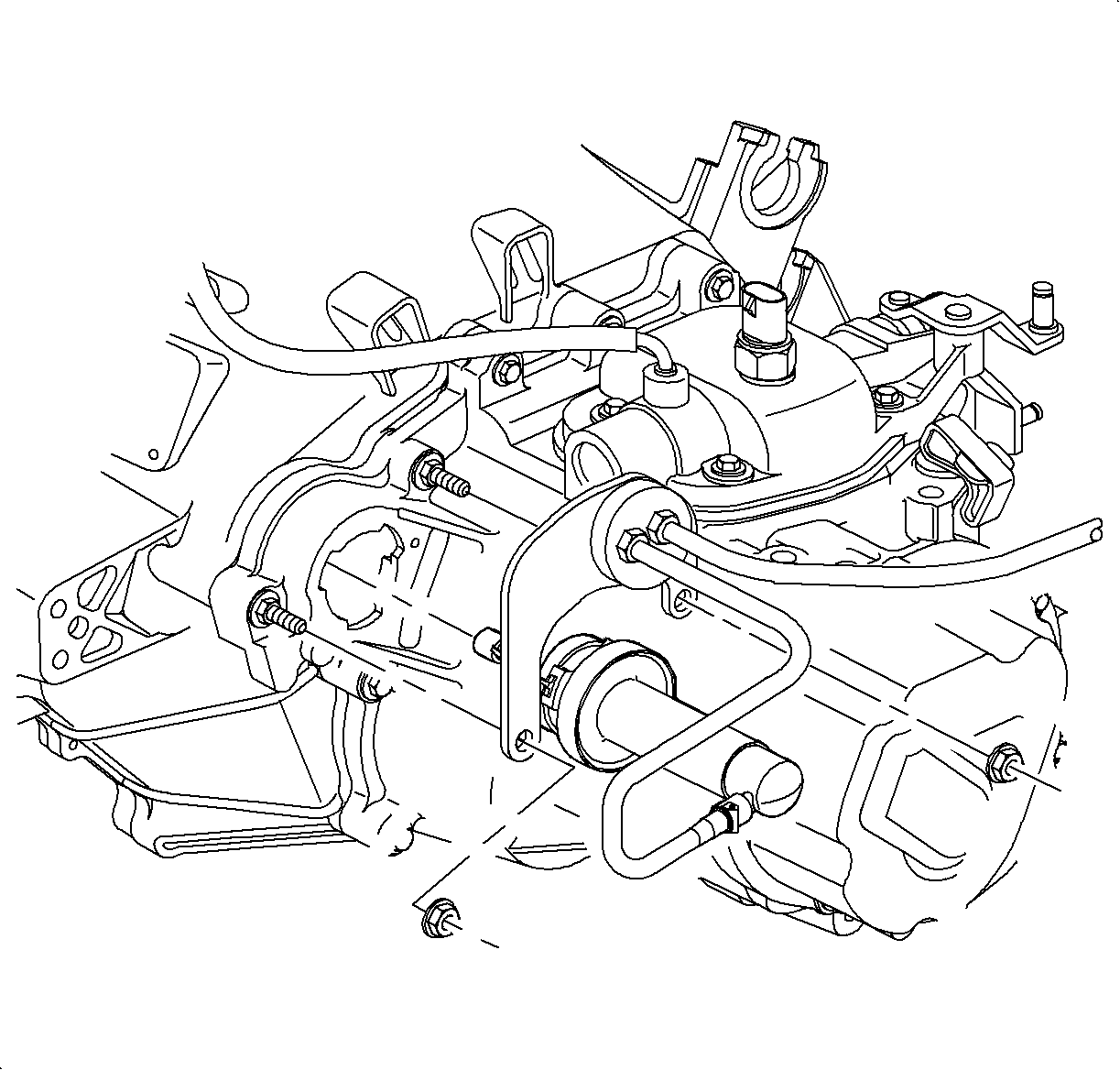
Important: Prior to removing the slave cylinder from the clutch housing, make sure that the clutch hydraulic system has sufficient fluid. Refer to the Clutch Hydraulic System Fluid Level Check.
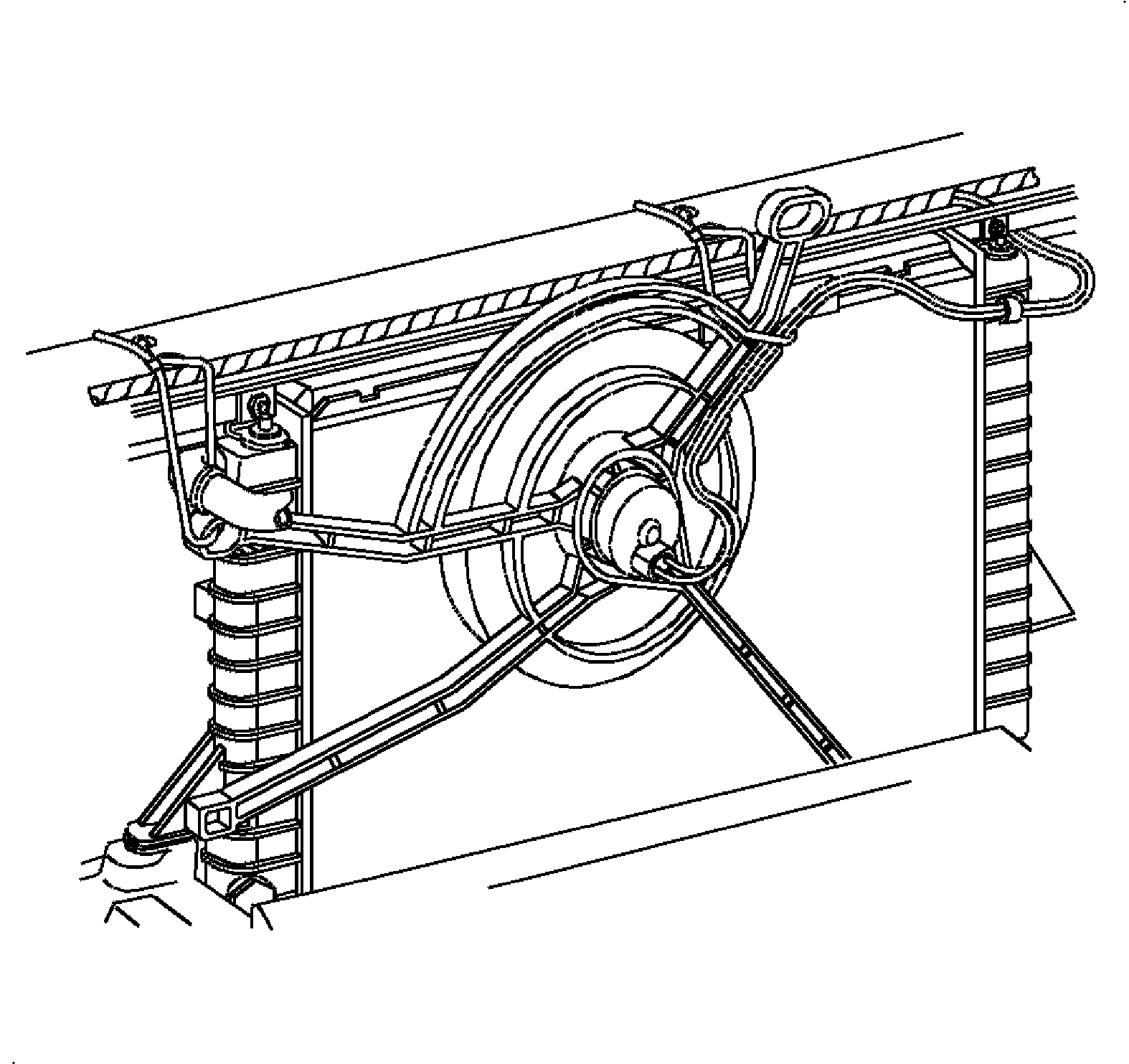
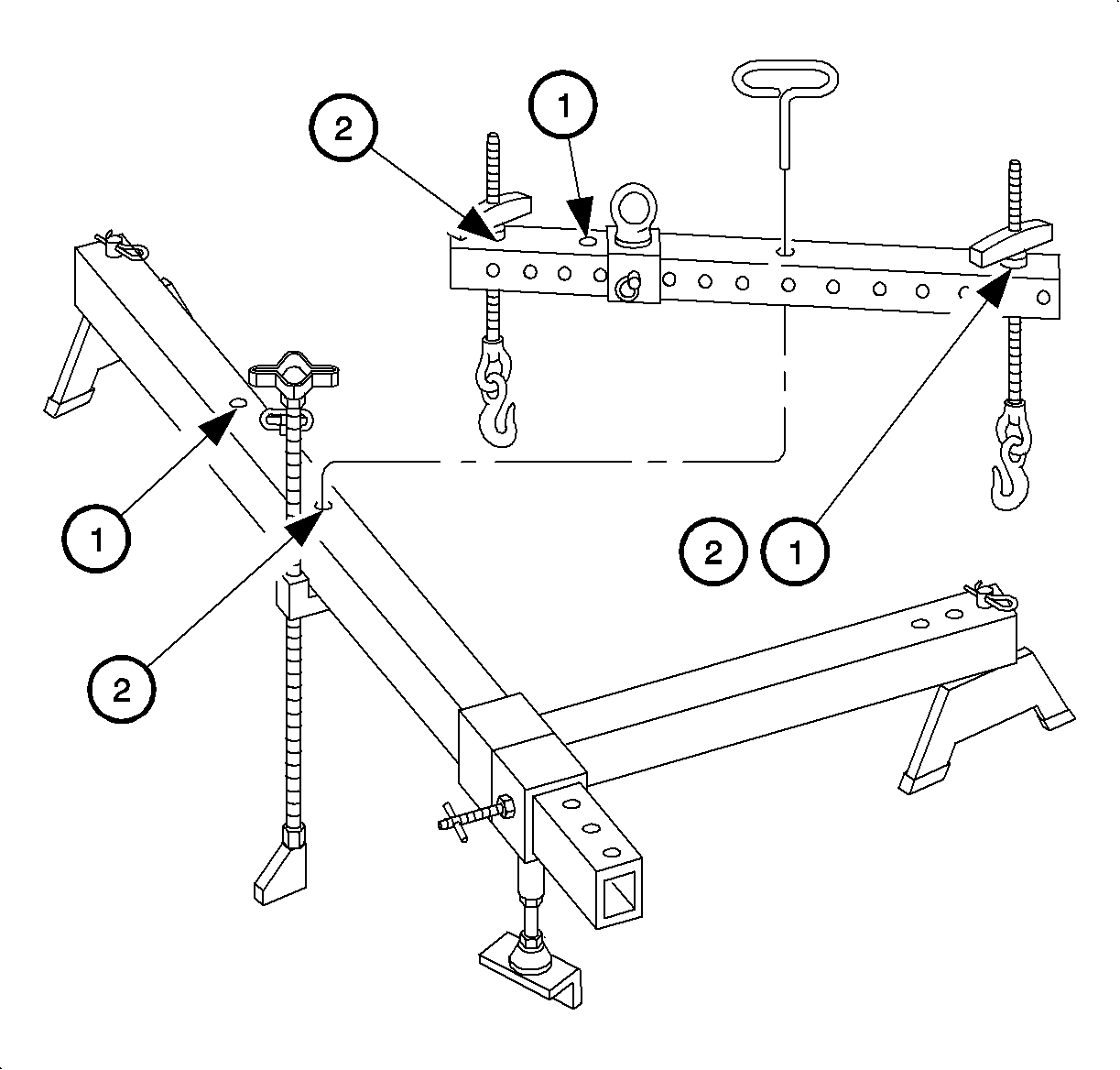
Important: The two cross bars on the engine support have 2 settings, 1 for the SOHC (L24) (1) and 1 for the DOHC (LL0) (2) engine. The setting locations are marked on the bars as shown.
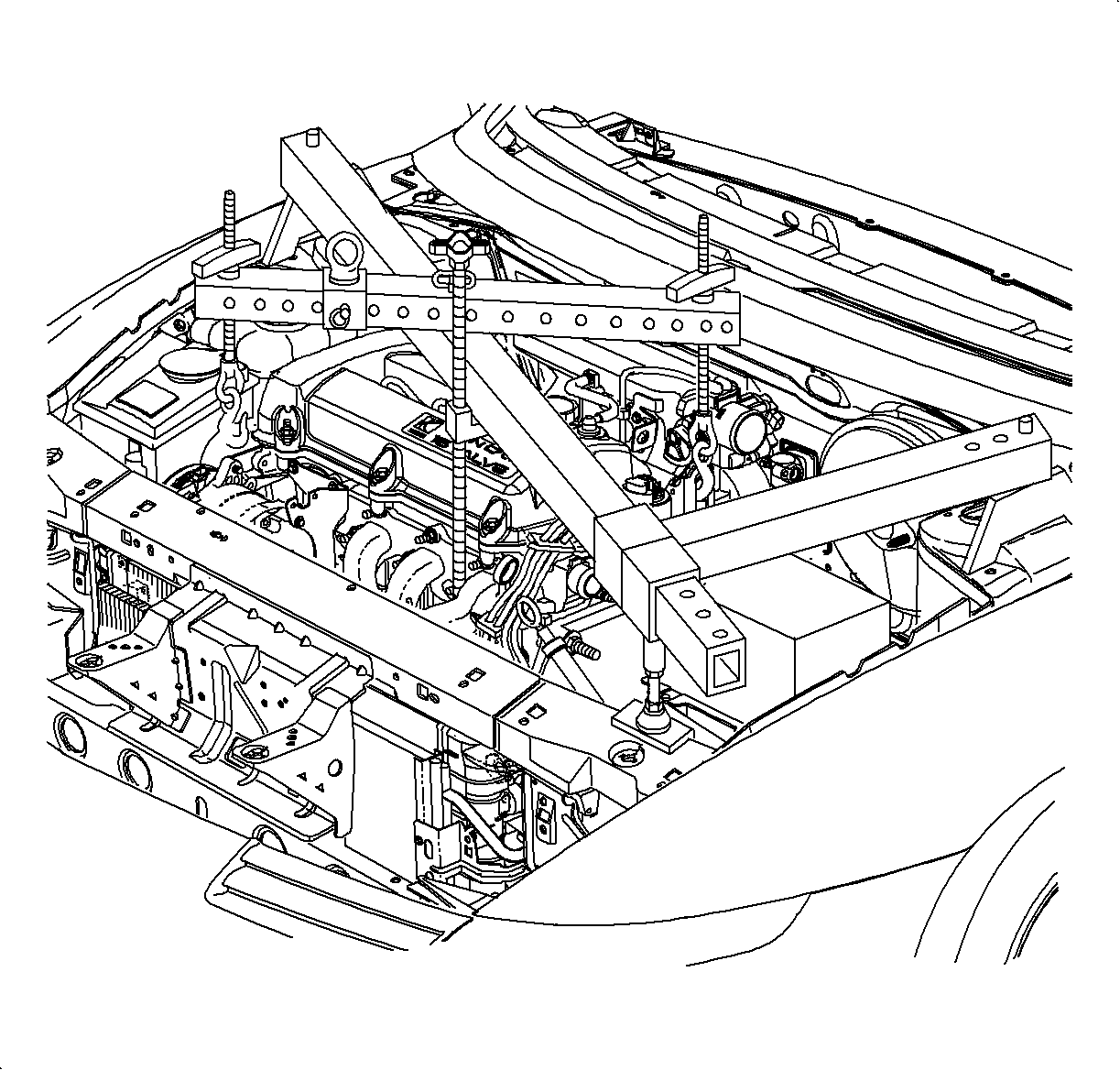

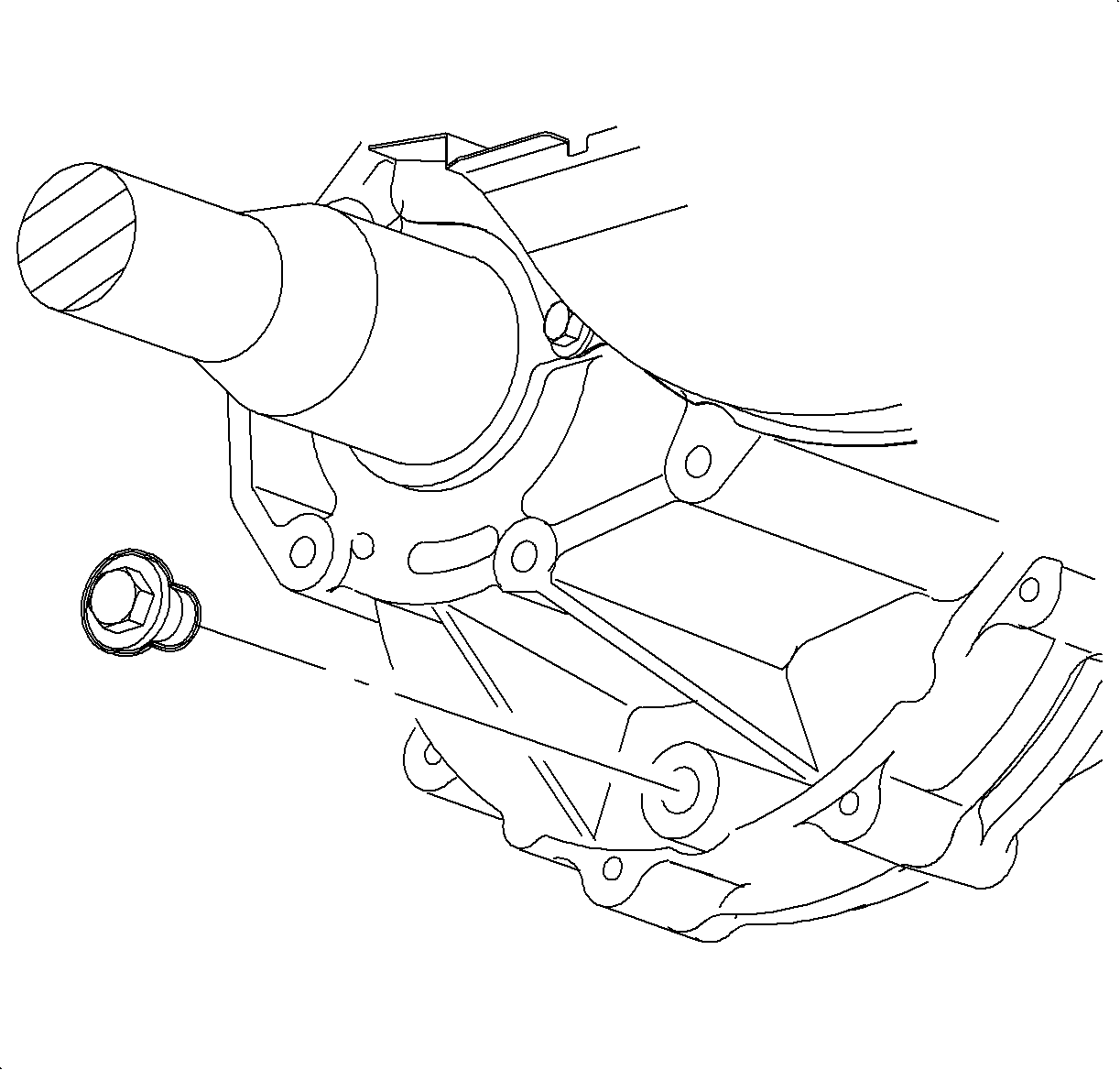
Caution: Ensure that the vehicle is properly supported and squarely positioned. To help avoid personal injury when a vehicle is on a hoist, provide additional support for the vehicle on the opposite end from which the components are being removed.
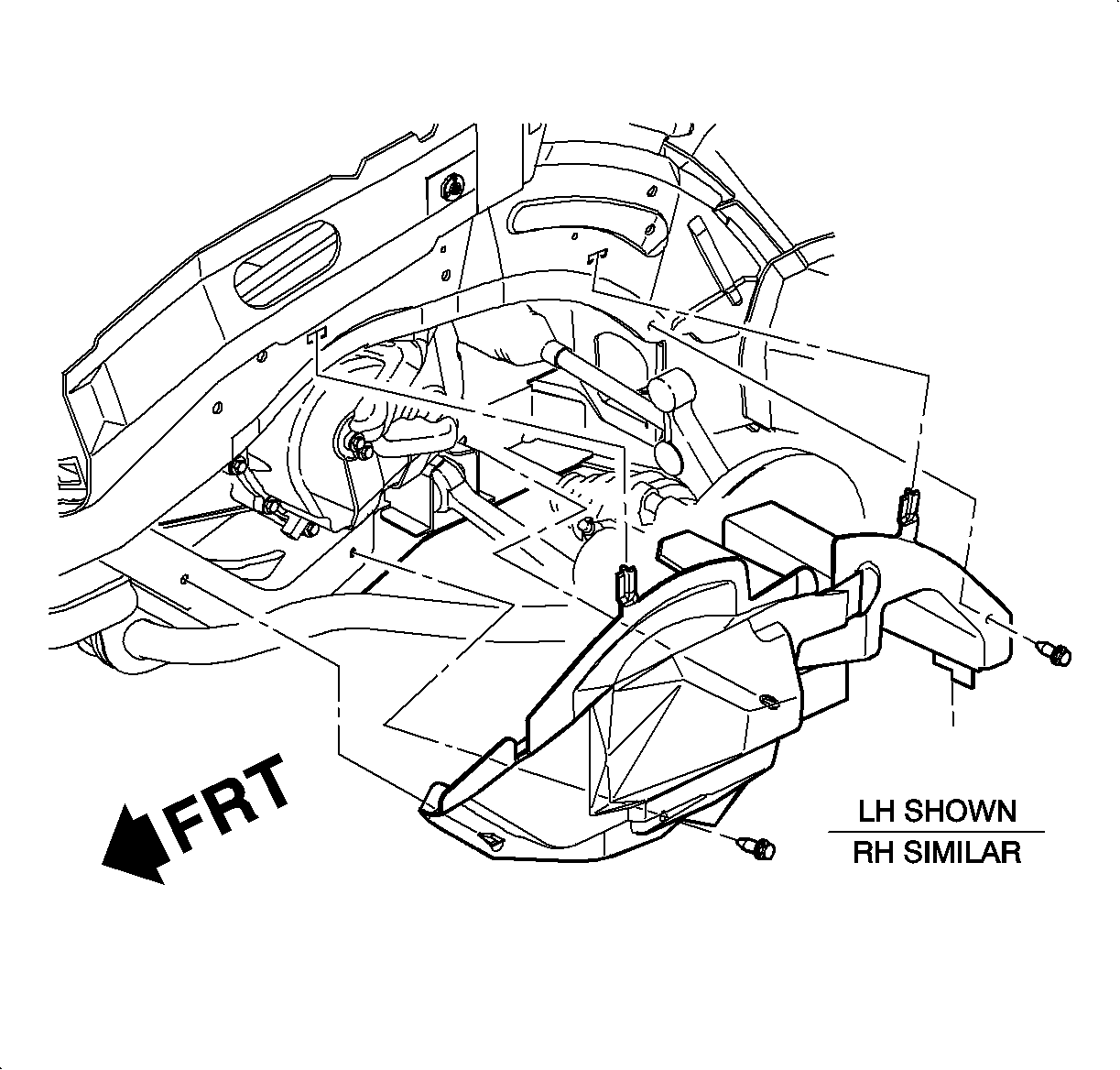
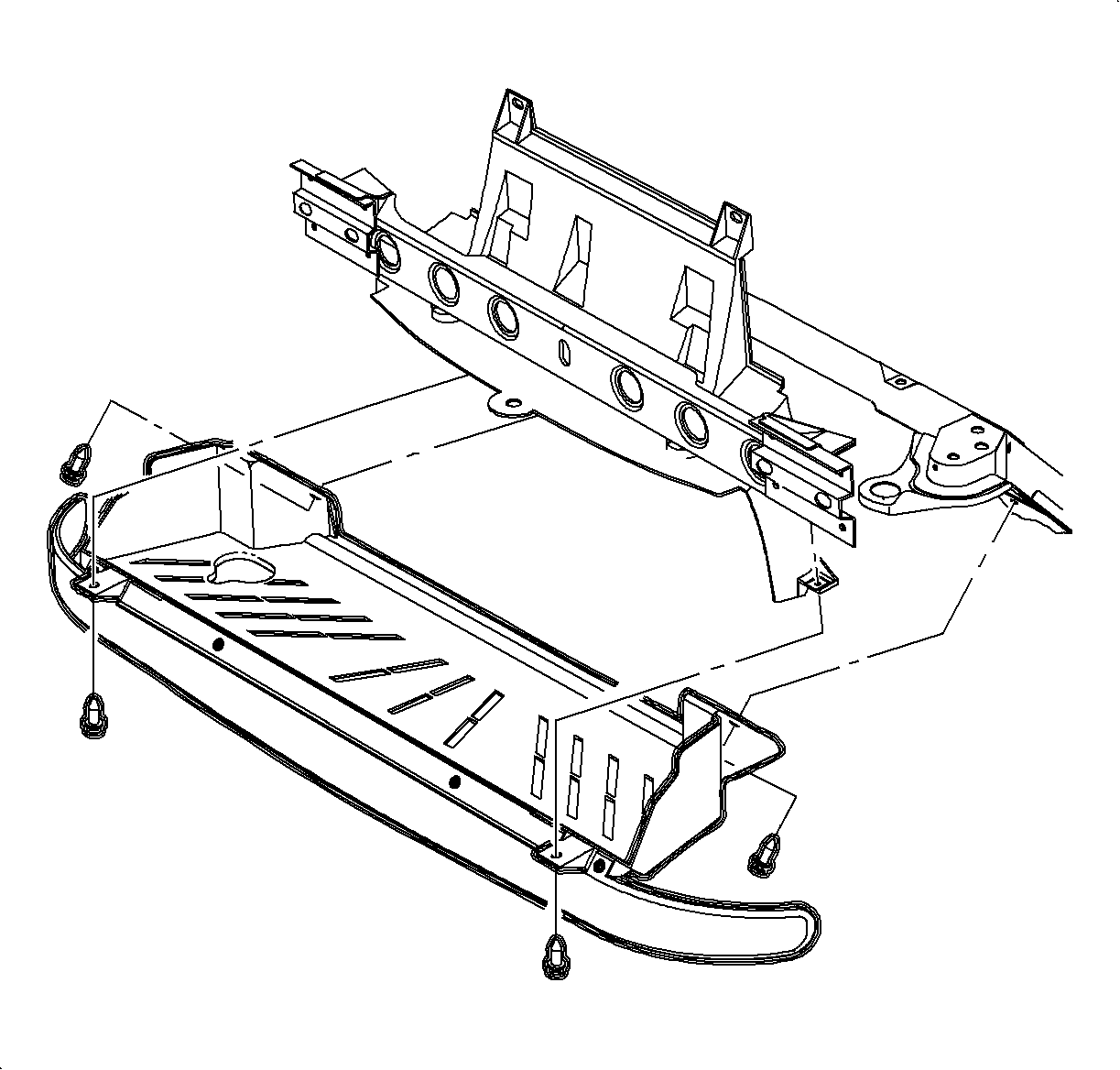
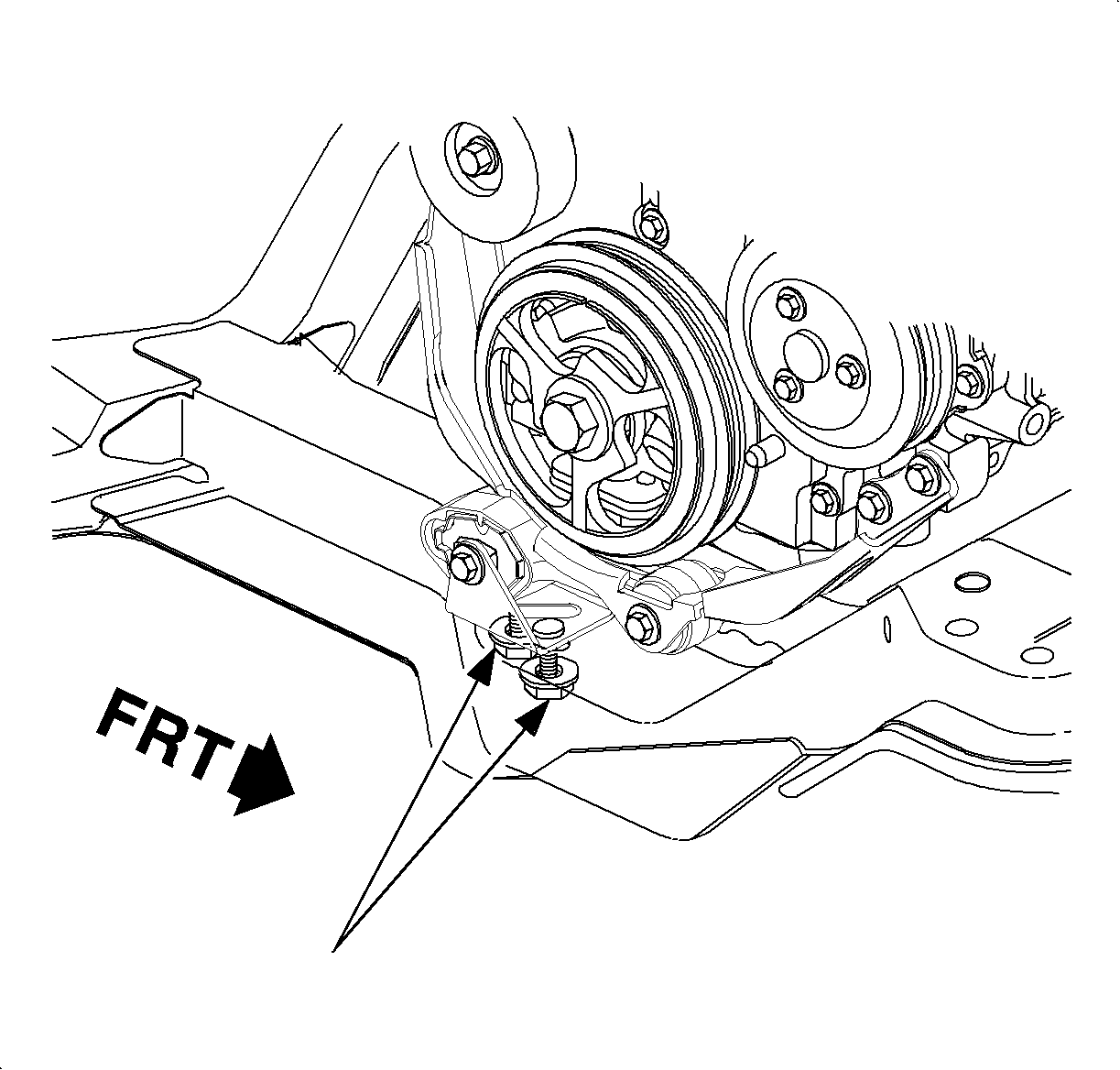
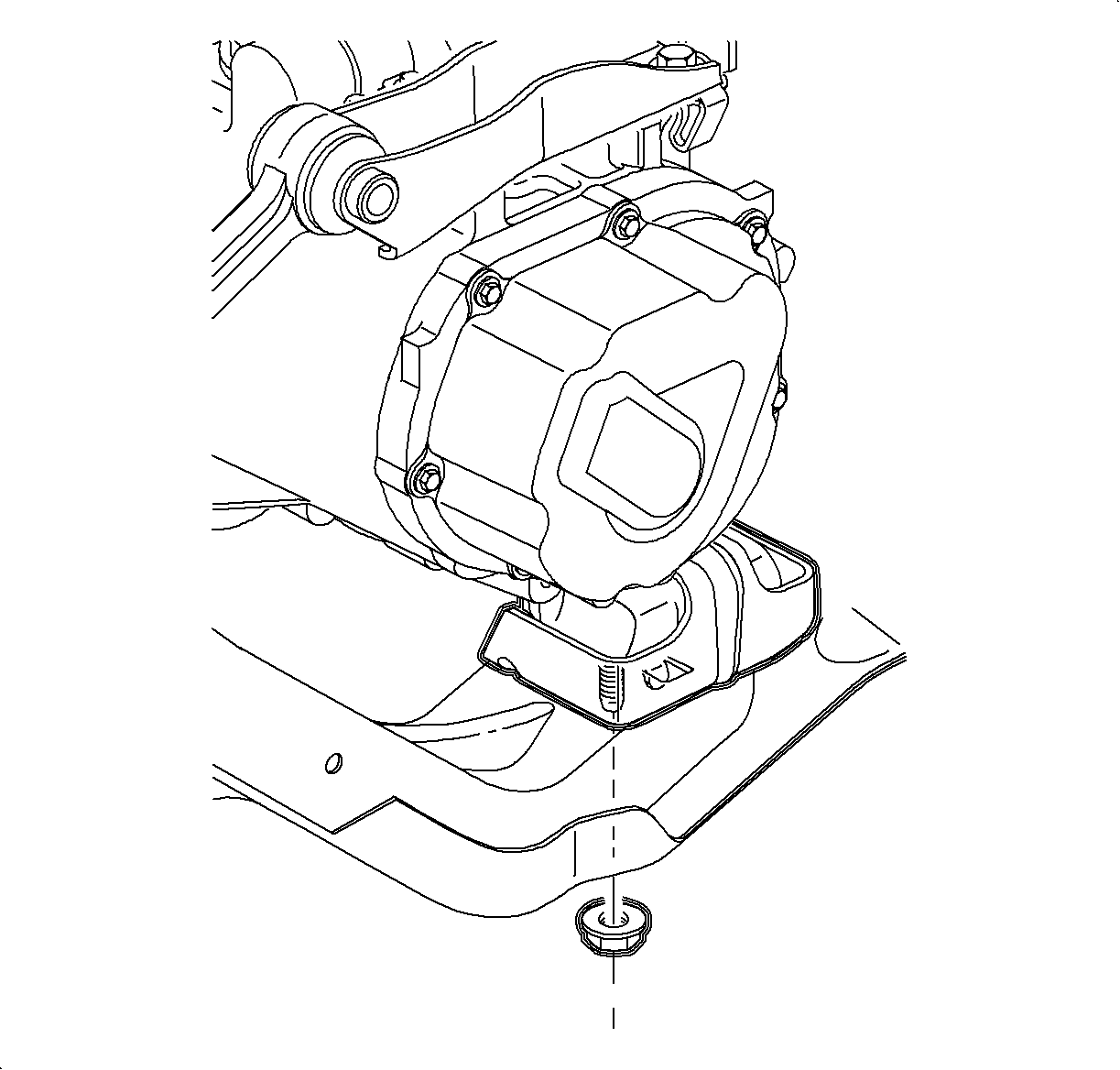
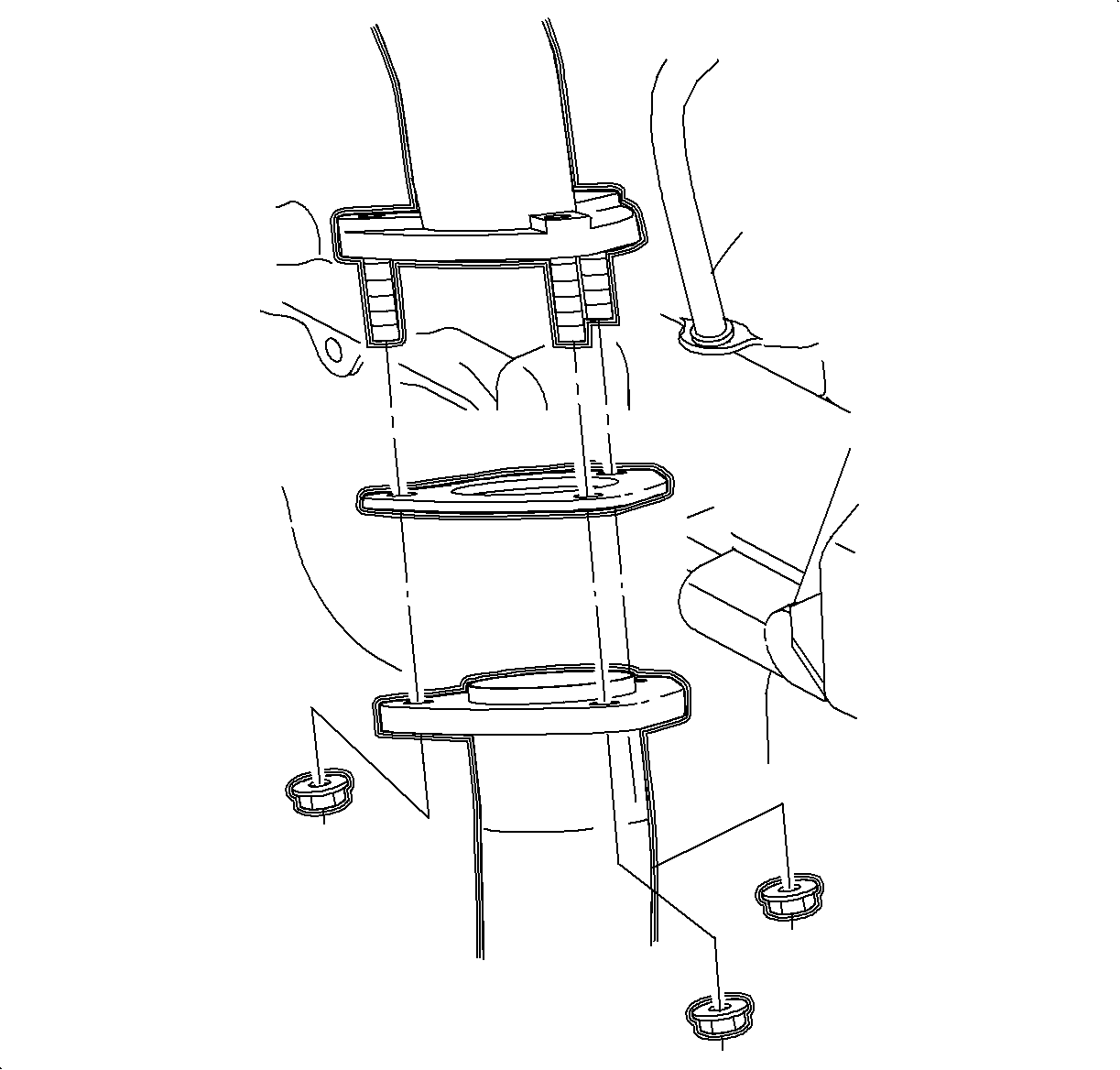
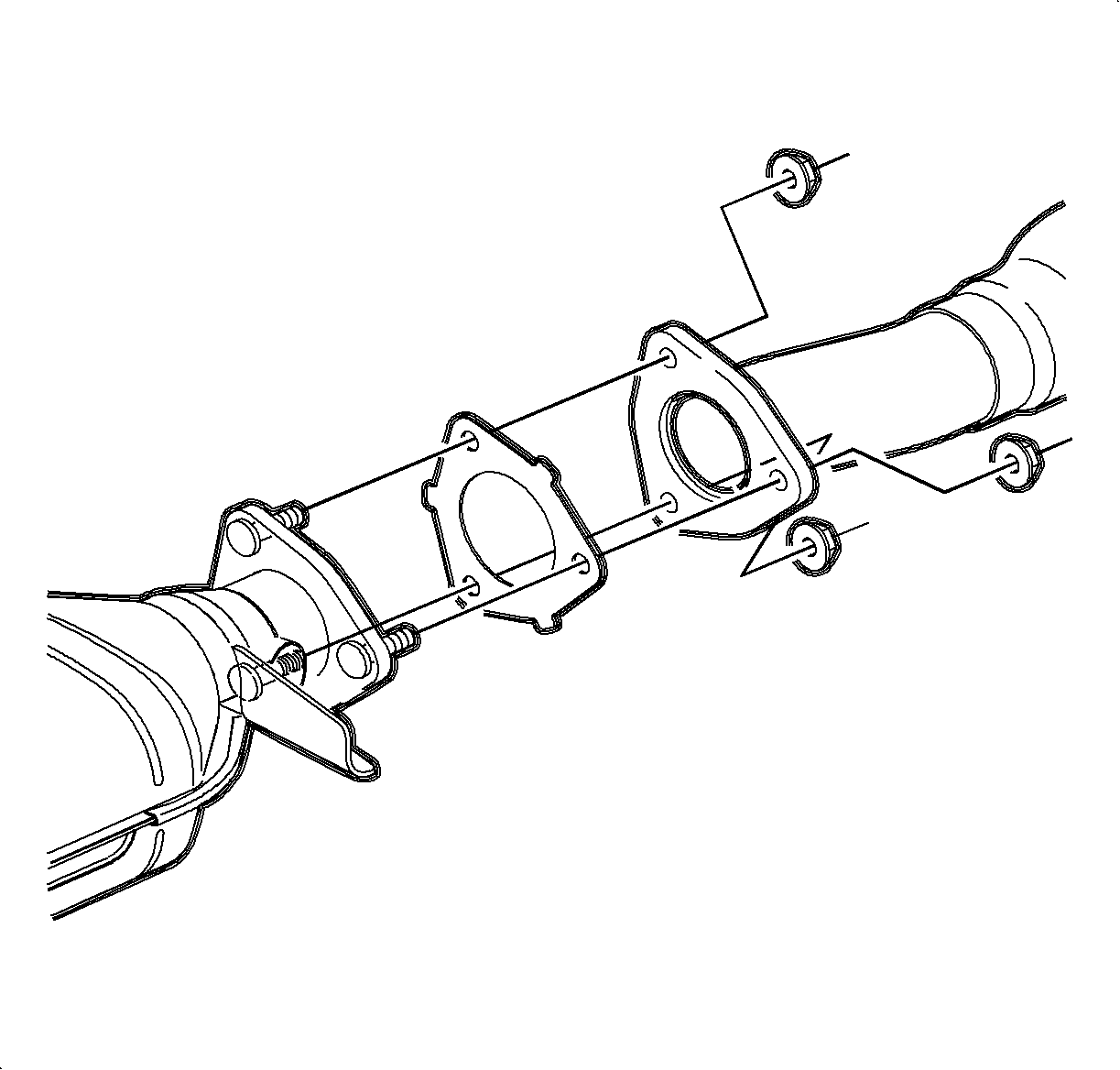
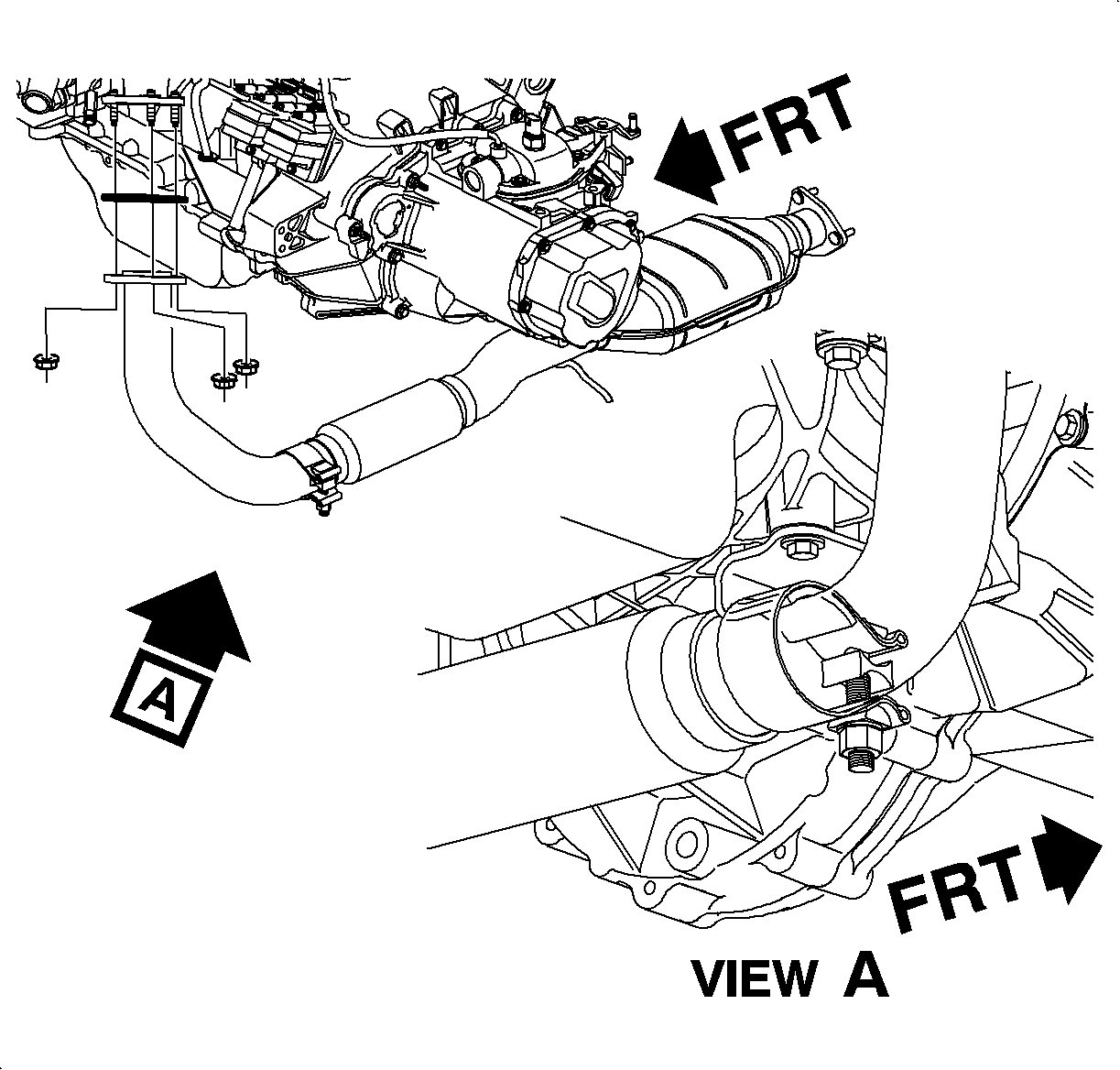
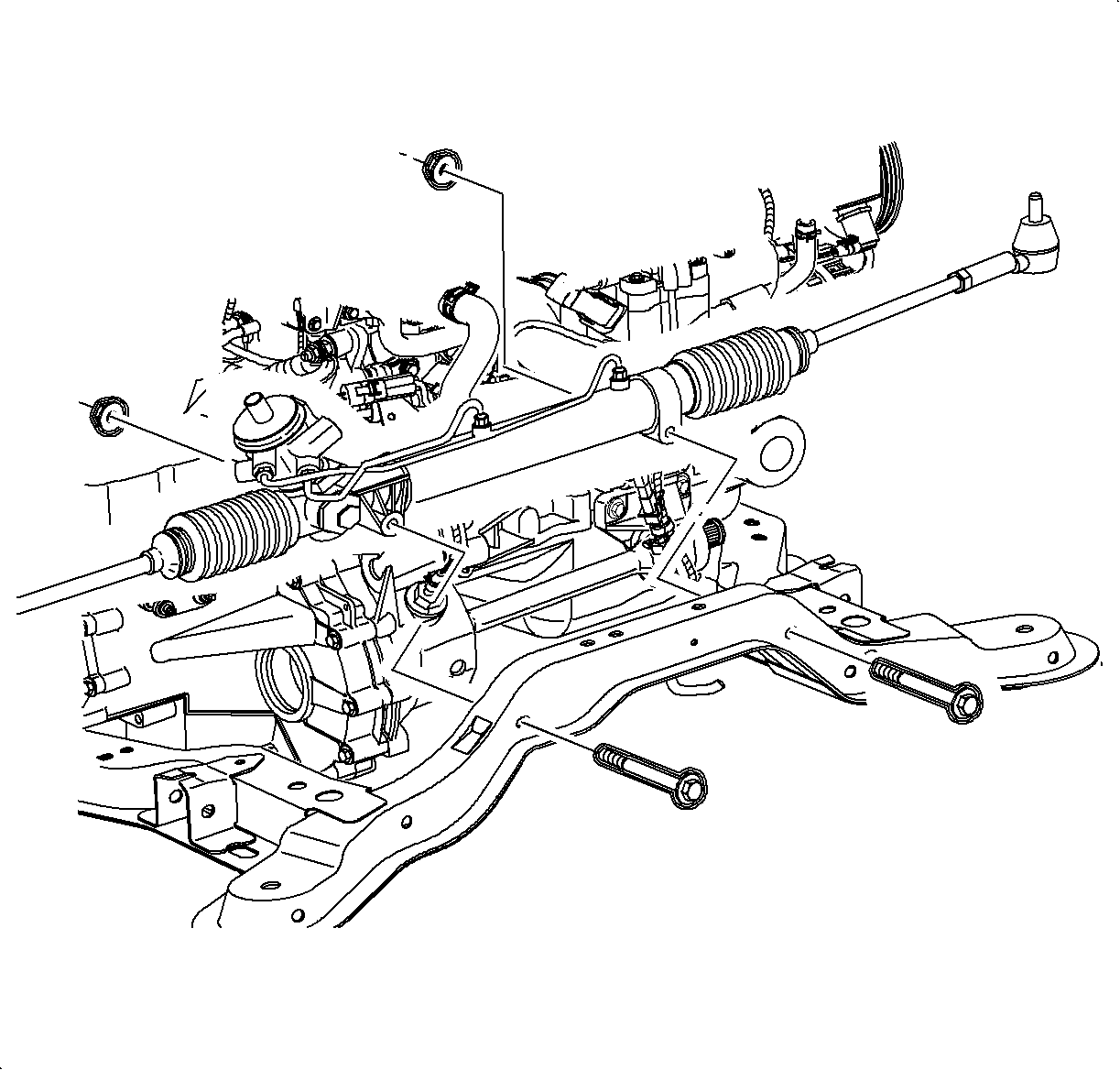
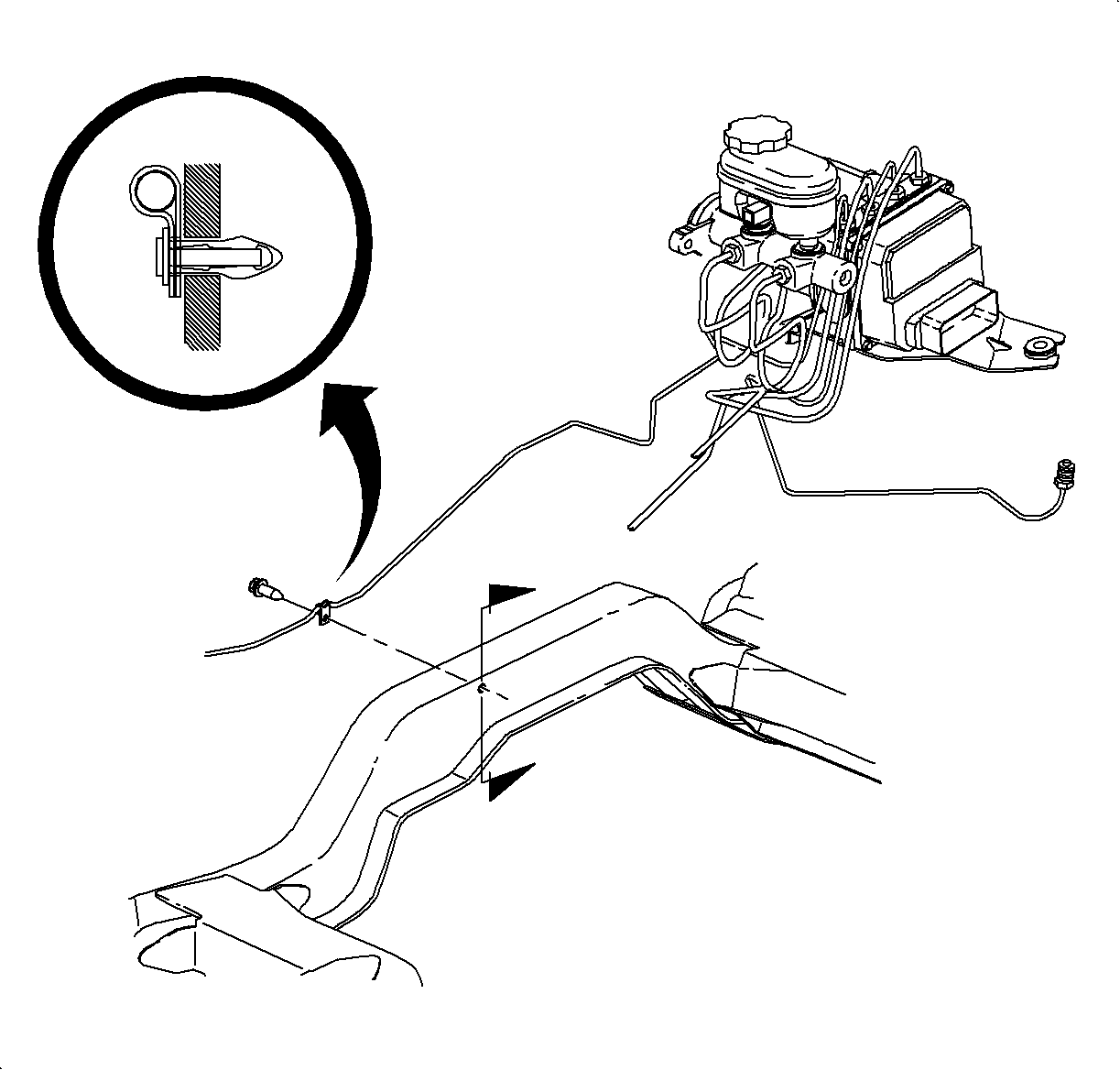
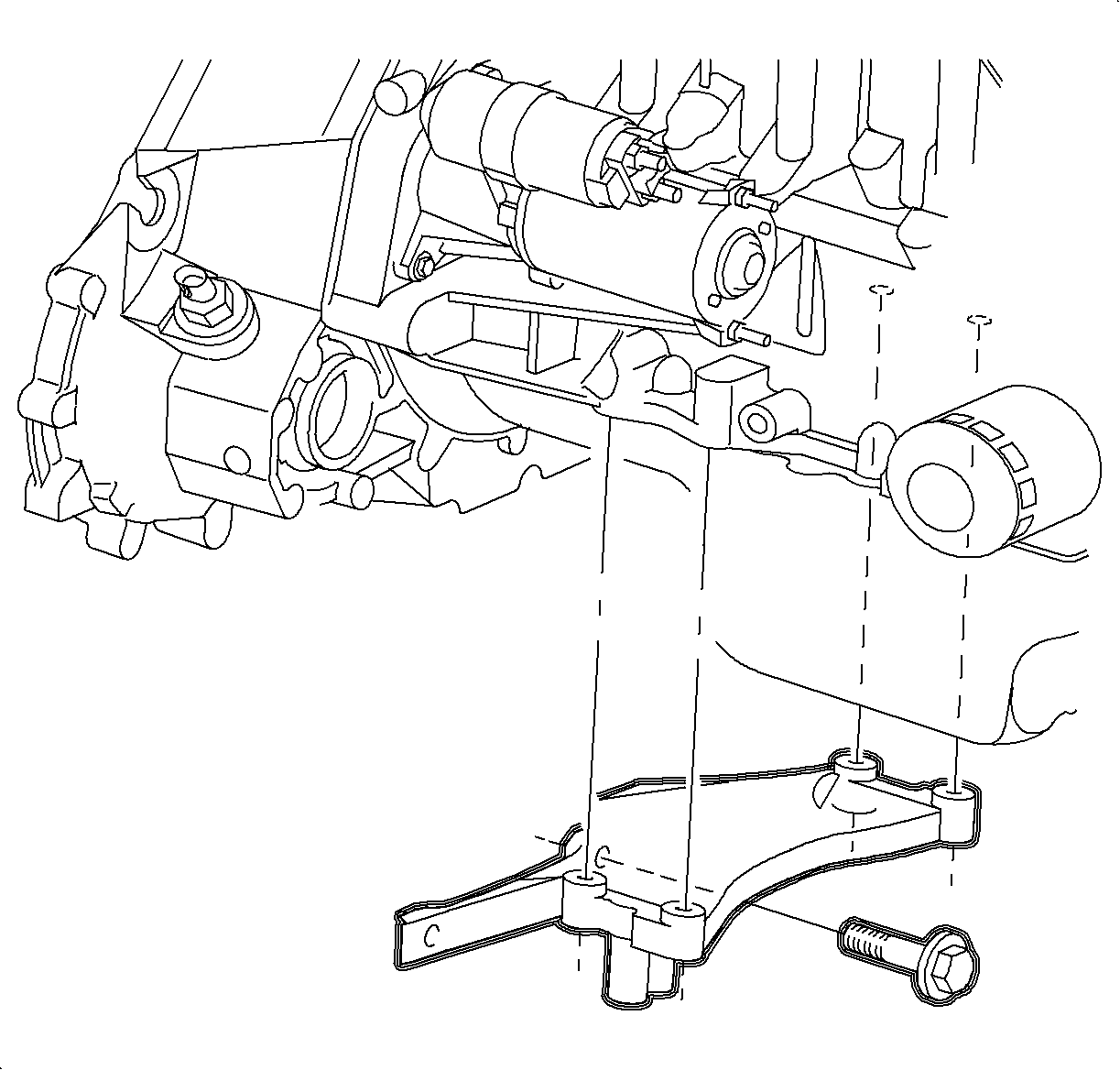
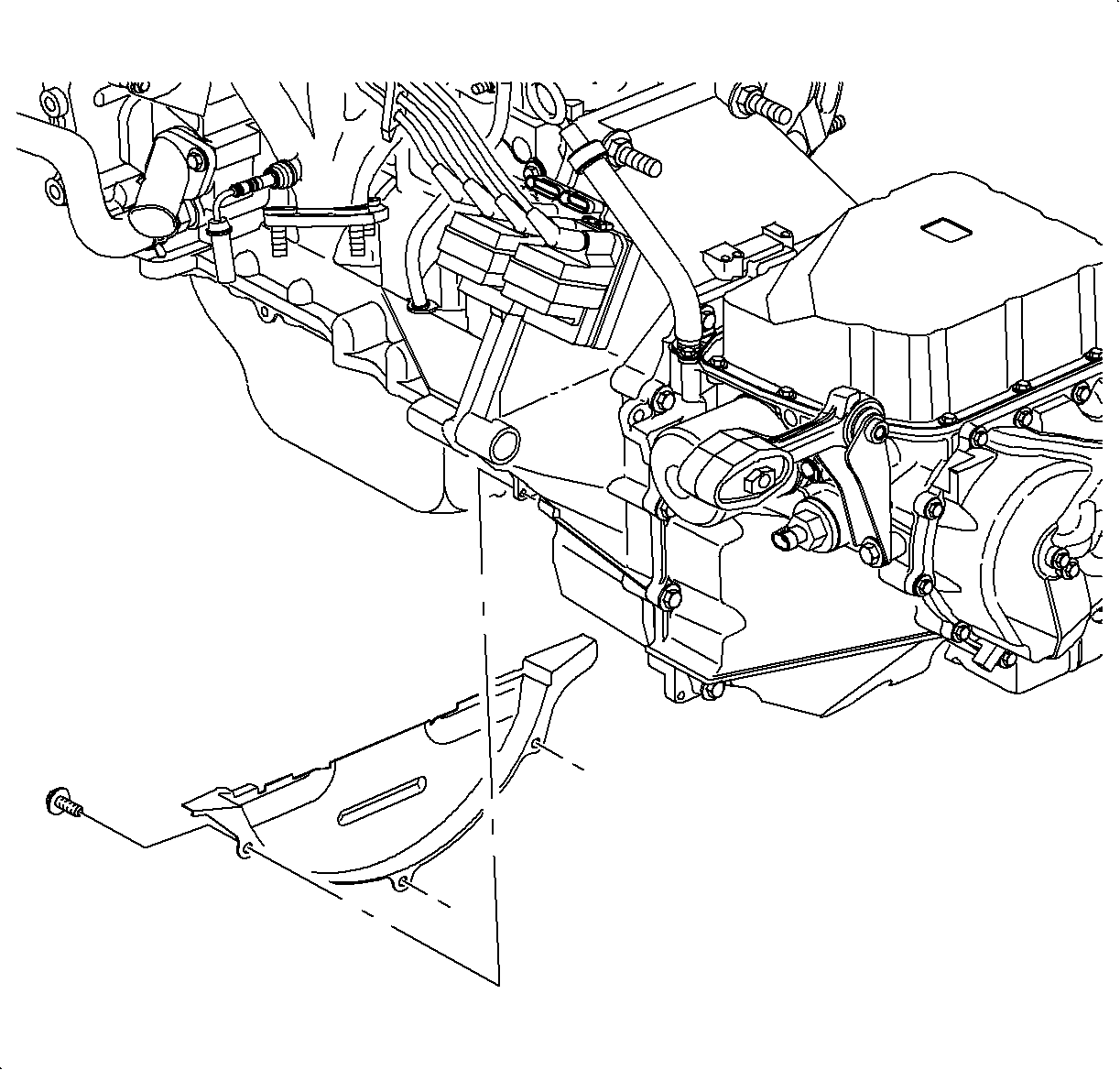
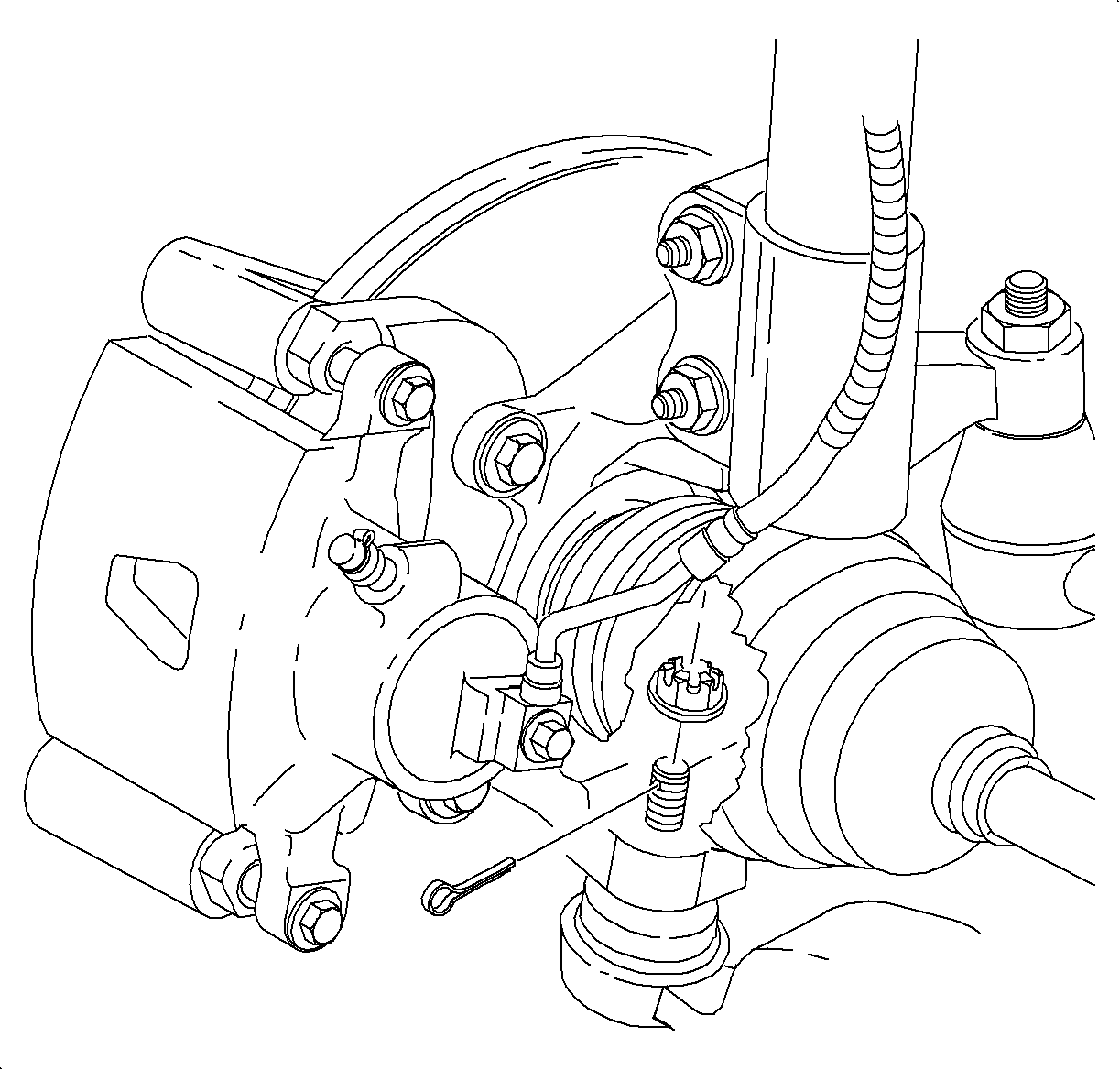
Repeat for the opposite side.
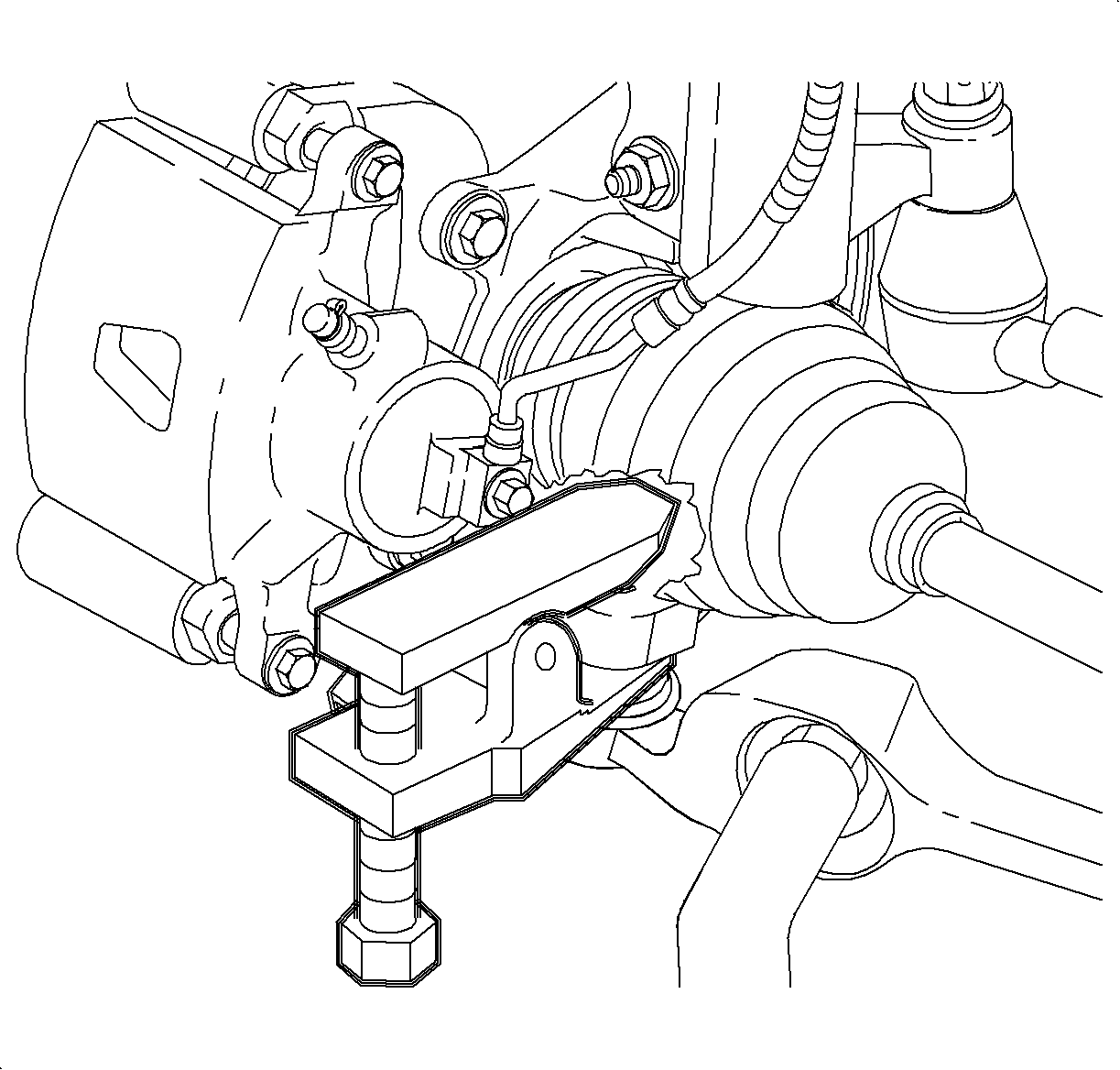
Notice: On ABS equipped vehicles, the outer CV joint has a speed sensor ring. Using the incorrect tool or procedure to separate the control arm from the knuckle can damage the ring, resulting in a loss of ABS operation.
Notice: Do not attempt to separate the joint using a wedge-type tool because seal may be damaged.
Important: It will be necessary to pull down on lower control arm to remove castle nut.
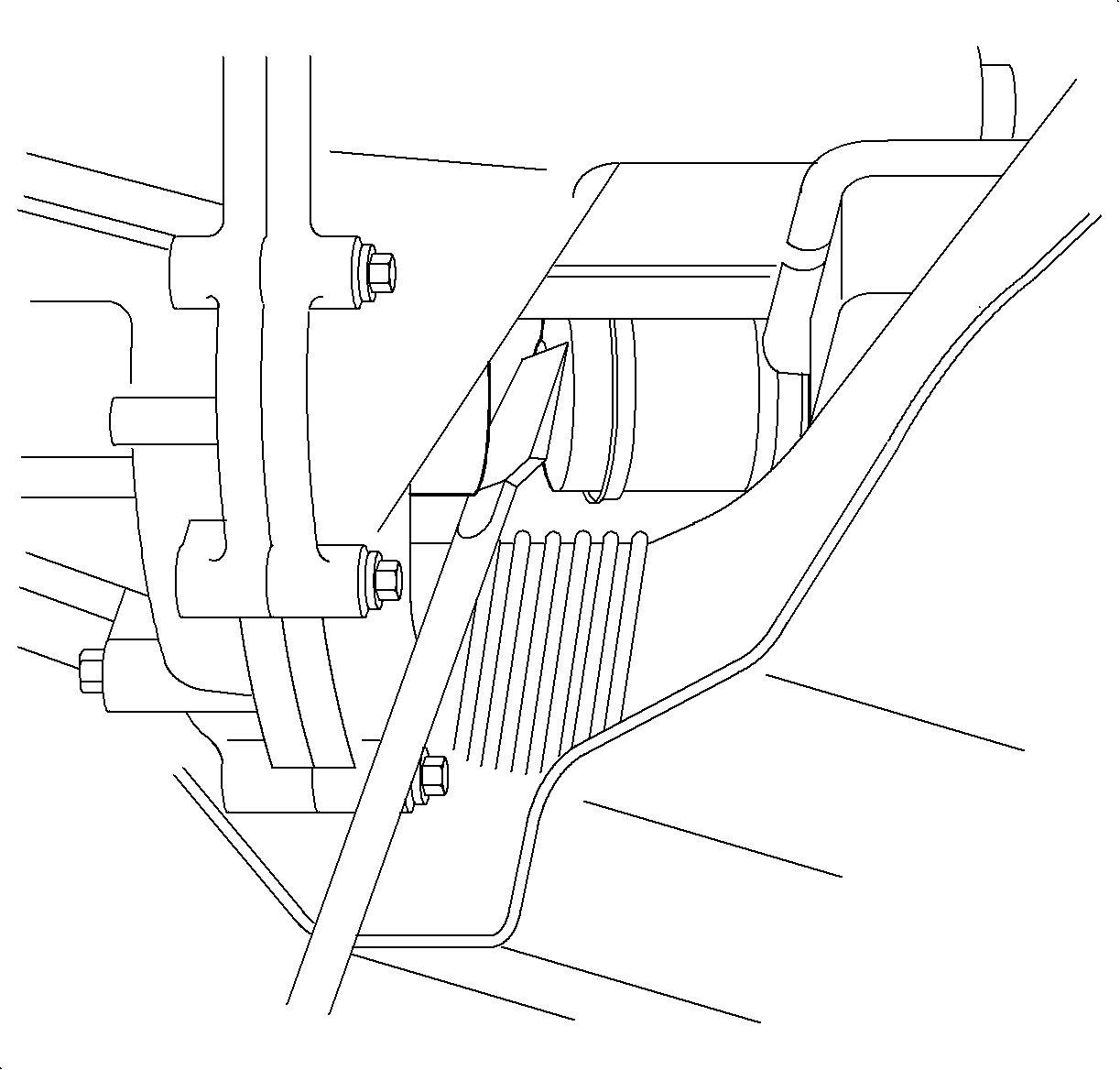
Notice: Do not allow screwdriver to contact axle seal or damage to the seal may occur.
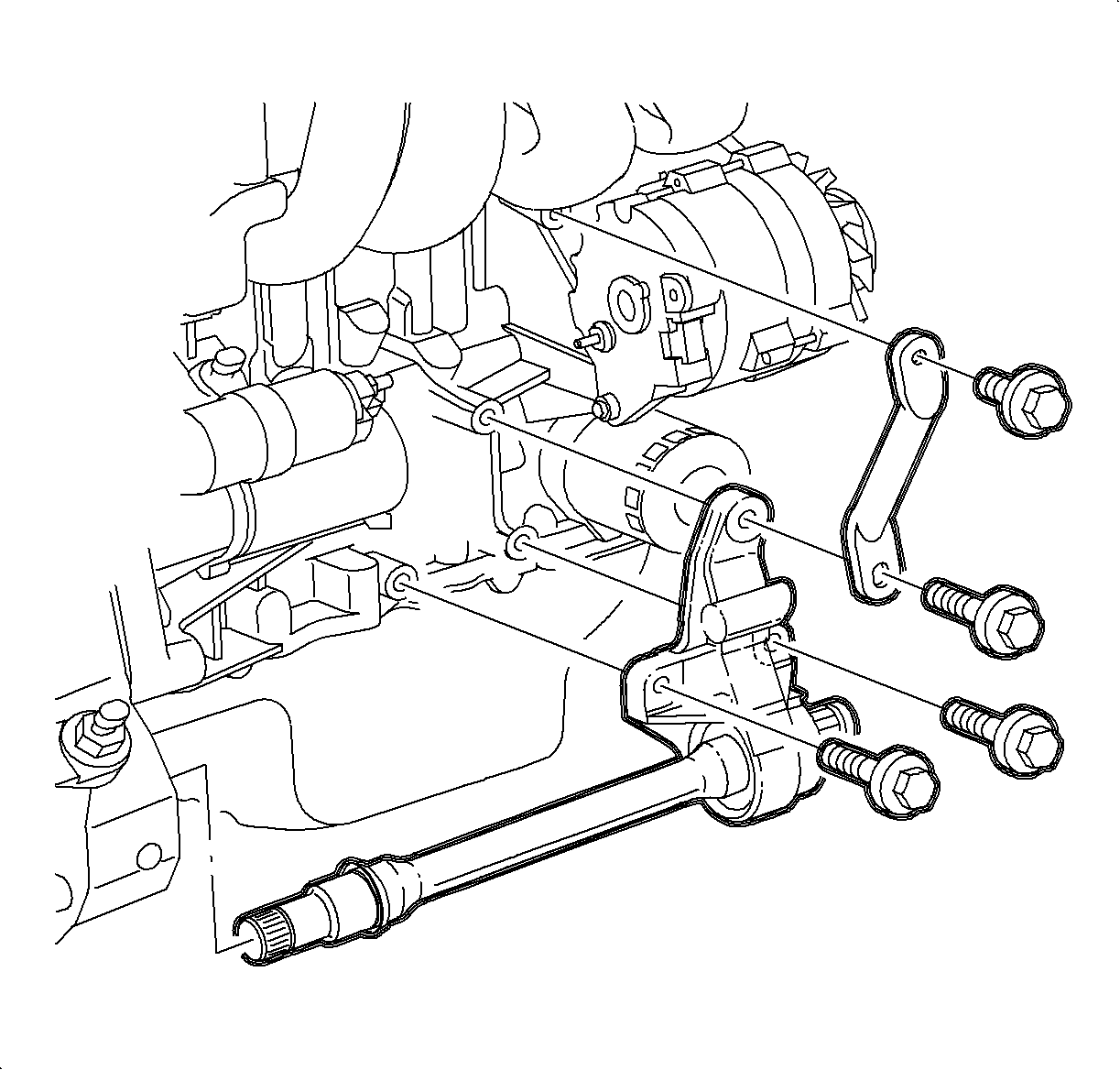
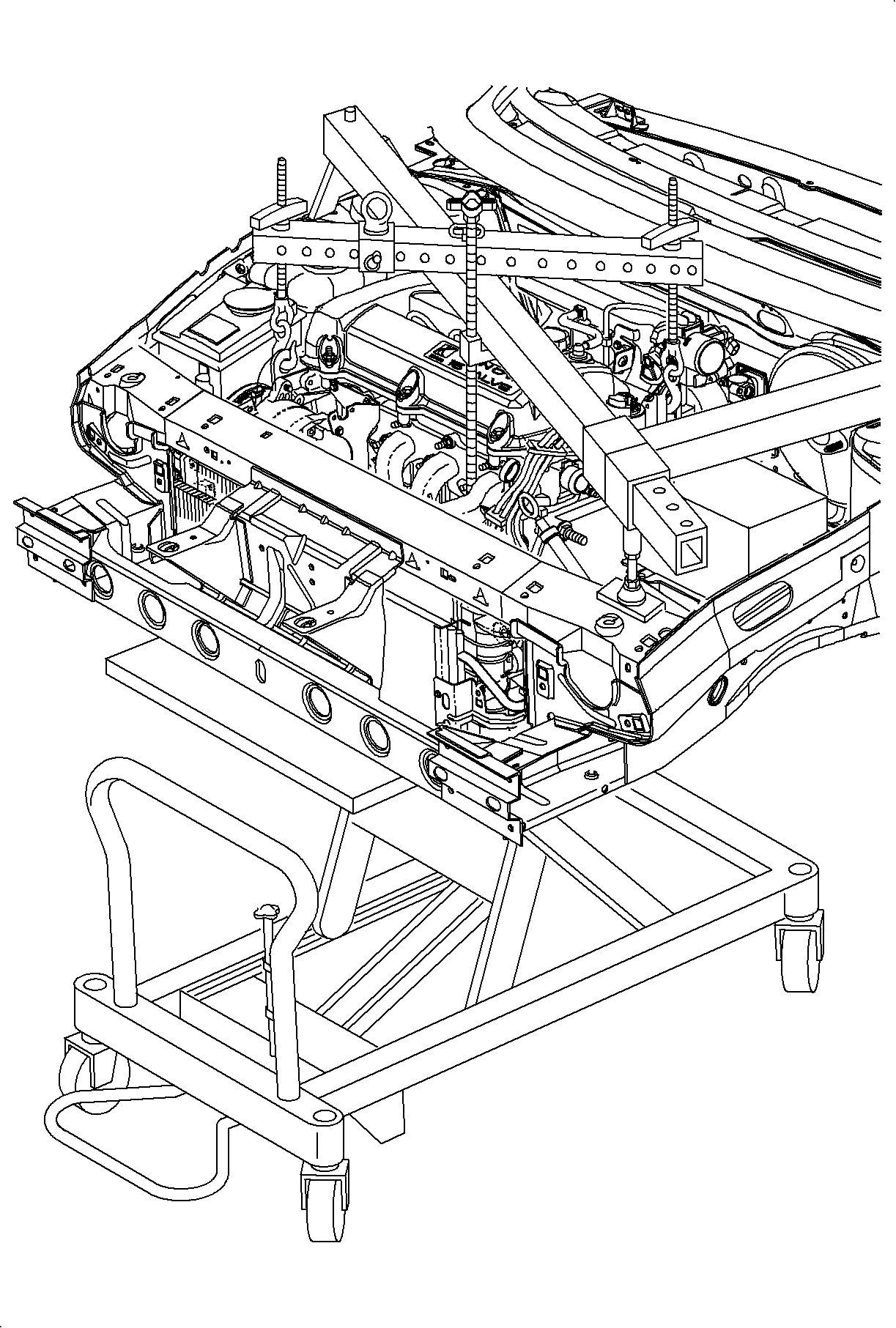
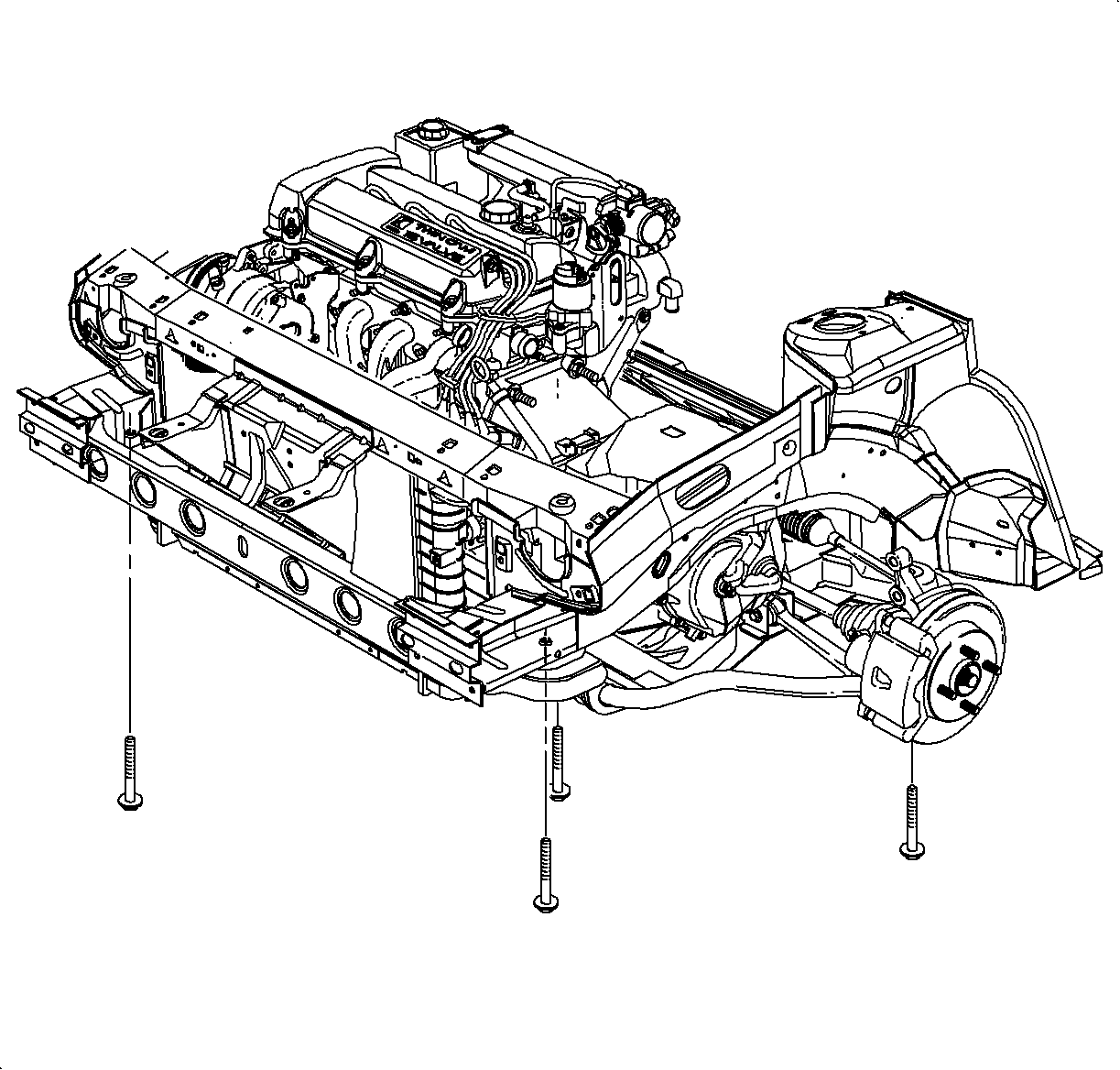
Important: Carefully lower the frame from the vehicle with the powertrain support dolly.
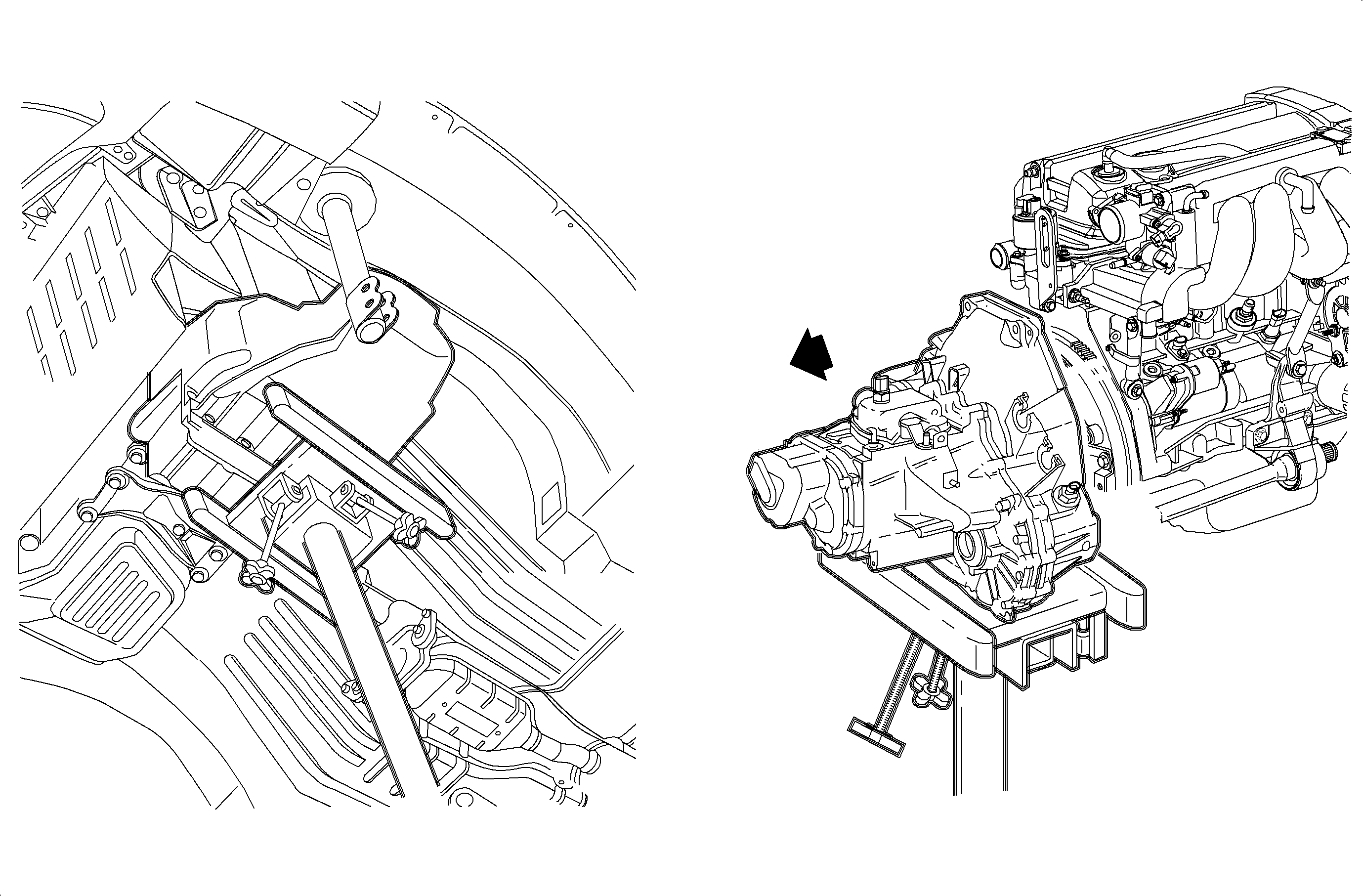
Installation Procedure
- Place the transaxle securely on jack and position it under the vehicle.
- Install the axle seal protector into seals on both sides; use the SA91112T .
- Place the transaxle in any gear.
- Raise the transaxle into vehicle to align input shaft to the center of the clutch. Guide the transaxle into position, rotate back and forth to align input shaft splines to the clutch disc.
- Install the 2 lower clutch housing to engine bolts.
- Remove the transaxle jack.
- Install the SA91112T inside seal on the transaxle case for left side seal.
- Install the left axle into transaxle.
- After the splines clear the seal protector but before snapping the axle into place, remove the seal protector tool.
- Install the SA91112T inside the seal on clutch housing for right side seal. Left side shown, right side similar.
- Install the intermediate shaft into the transaxle.
- After the splines clear the seal protector but before snapping the axle into place, remove the seal protector tool.
- Position the intermediate shaft support and install the 2 bolts.
- Install the starter bracket to intermediate shaft bolt, if removed.
- On DOHC (LL0) vehicles, position the intake manifold support bracket and install the intake bracket to the intake manifold bolt.
- Install the intake bracket to intermediate shaft support bolt.
- Install the right axle to the intermediate shaft.
- Clean and lubricate the ball joint threads.
- Place the frame on a lift and raise it to the vehicle and place the lower ball joint into the knuckles when raising the frame up.
- Install the 2 rear frame-to-body fasteners.
- Position the frame-to-body at the 2 front frame-to-body fasteners.
- Tighten the four frame-to-body fasteners.
- Remove the powertrain support dolly.
- Lower the vehicle and remove the SA9105E .
- Install the transaxle strut, transaxle bracket-to-transaxle bolts, if removed.
- Install transaxle strut-to-midrail bracket fastener.
- Tighten the transaxle strut-to-transaxle bracket fastener, if removed.
- Remove the cooling module support wire.
- Inspect the electronic ignition module bolts to make sure mating surfaces are free from grit and dirt. If using new bolts, make sure they are coated with yellow thread sealant. Otherwise apply RTV sealant P/N 21006236 to the bolt threads.
- Install the electronic ignition module and bolts. Automatic transaxle shown, manual transaxle similar.
- Install the top 2 clutch housing to engine studs. Automatic transaxle shown, manual transaxle similar.
- Connect the electrical connectors to the transaxle.
- Connect the shifter cables to shift arms and clutch housing. Install the cable retainers.
- Unwire the clutch hydraulic system from the upper radiator hose. Install the 2 clutch hydraulic system to the clutch housing nuts.
- Install the actuator into clutch housing. Push in and rotate 1/4 turn clockwise. Install the retaining clip.
- Check the master cylinder at front of the dash connection to be sure it is locked in place.
- Install the battery tray and bolt in the fender well (1).
- Install the PCM and the PCM attachment bolts.
- Reconnect the PCM J2 (black 28-way) harness connector.
- Make sure the battery tray is clean.
- Make sure that the battery cable ends are clean and free of corrosion. Clean with a wire brush.
- Make sure that the battery is in good physical condition, e.g., no cracks, or obvious damage, and that the terminals are clean.
- Install the battery carefully in the battery tray, make sure that the terminals do not short against any metal during the installation.
- Install the battery hold-down retainer, locking the battery into the tray. Install and tighten the hold-down retainer nut and screws.
- Install the air cleaner housing and duct assembly. Refer to Floor Air Outlet Replacement .
- Connect the intake air temperature (IAT) sensor connector.
- Raise the vehicle on a hoist.
- Install the transaxle lower mount-to-frame fastener.
- Install the two engine strut frame bracket-to-frame fasteners.
- Remove the steering gear support wire.
- Install the steering gear-to-frame attachment fasteners. Power steering gear shown, manual steering gear similar.
- Connect the brake pipe-to-frame retainer.
- Install the flywheel housing cover to clutch housing bolts.
- Install the engine to transaxle stiffening brace and install the brace to engine and transaxle bolts.
- Position the exhaust manifold pipe into vehicle.
- Install the exhaust manifold pipe-to-exhaust manifold fasteners and tighten.
- Install the intermediate exhaust pipe-to-three way catalytic converter flange fasteners.
- Clamp the support to the engine stiffening bracket.
- Clamp the support to the front exhaust pipe.
- Install the nut to lower ball joint.
- Install the right side, left side, and front splash shield to the frame fasteners.
- On Coupes, install the right and left lower fascia support to the frame J-nuts.
- Position the wheels onto hubs.
- Install the wheel nuts and tighten in a crisscross pattern. Repeat the tightening pattern to be sure torque is correct.
- Install the drain plug.
- Fill the transaxle to proper level using Saturn Transaxle Fluid.
- Install the positive battery cable first.
- Install the negative battery cable last.
- Perform the vehicle alignment. Refer to alignment procedures in the Chassis Service Manual.
Important: When reinstalling the transaxle, tap out the ignition module mounting holes prior to installing the transaxle.

Tighten
Tighten the clutch housing-to-engine bolts to 140 N·m (103 lb ft)
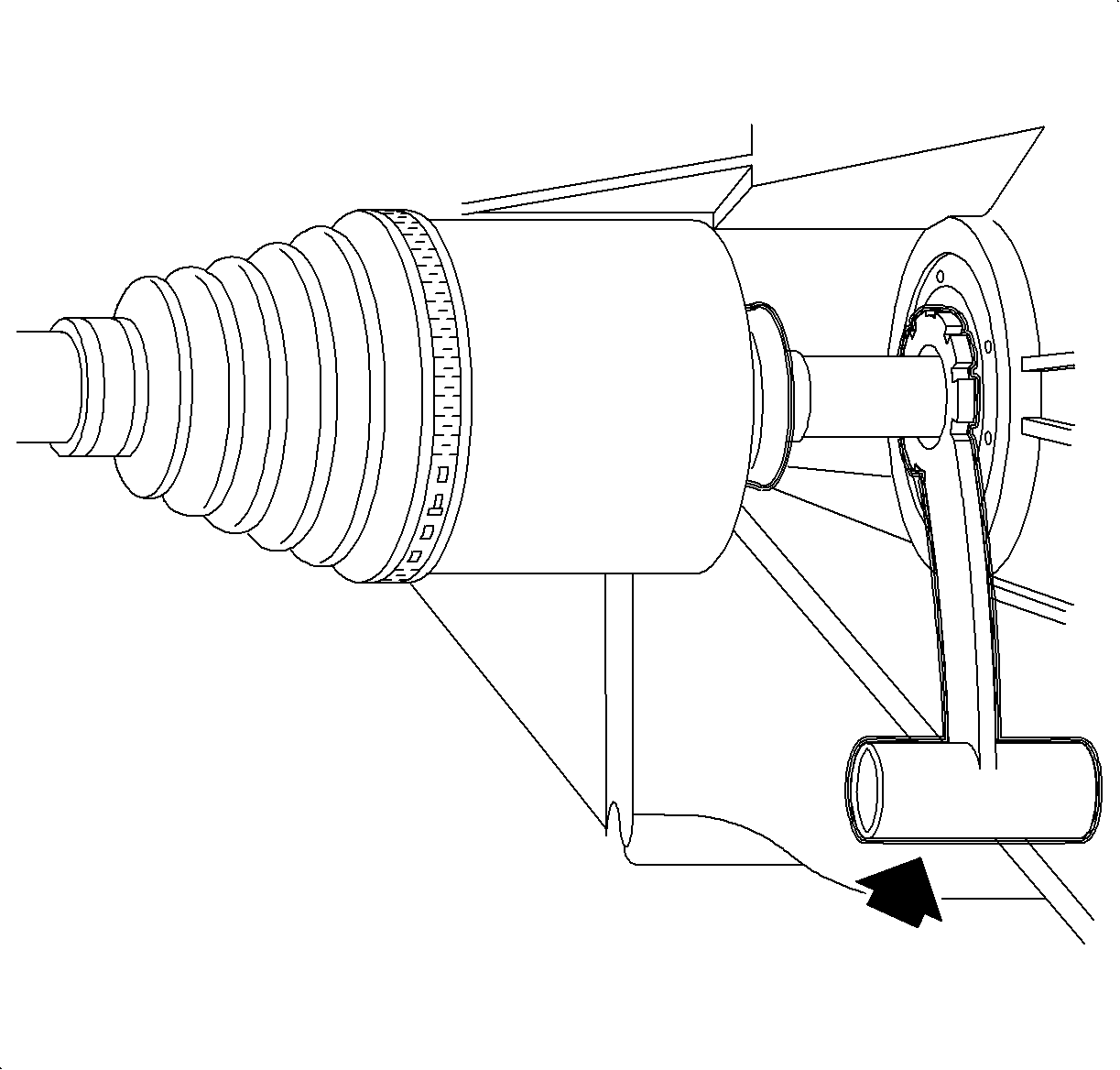
Notice: Use caution not to damage axle seal when intermediate shaft is installed into transaxle.

Notice: Use caution not to damage axle seal when intermediate shaft is installed into transaxle.
Tighten
Tighten the intermediate shaft support bracket-to-engine
bolts to 54 N·m (40 lb ft).
Tighten
Tighten the intake manifold support bracket-to-intake
manifold bolt (LLO) to 30 N·m (22 lb ft).
Tighten
Tighten the intake manifold support bracket-to-intake
manifold bolt (LLO) to 30 N·m (22 lb ft).
Tighten
Tighten the intake manifold support bracket-to-intermediate
shaft support bracket nut (LLO) to 54 N·m (40 lb ft).

Notice: Make sure that the following parts are correctly positioned when raising frame
into vehicle:
• Lower corner arm ball studs to knuckle. • Cooling module support grommets. • Engine strut frame bracket. • Transaxle mount.
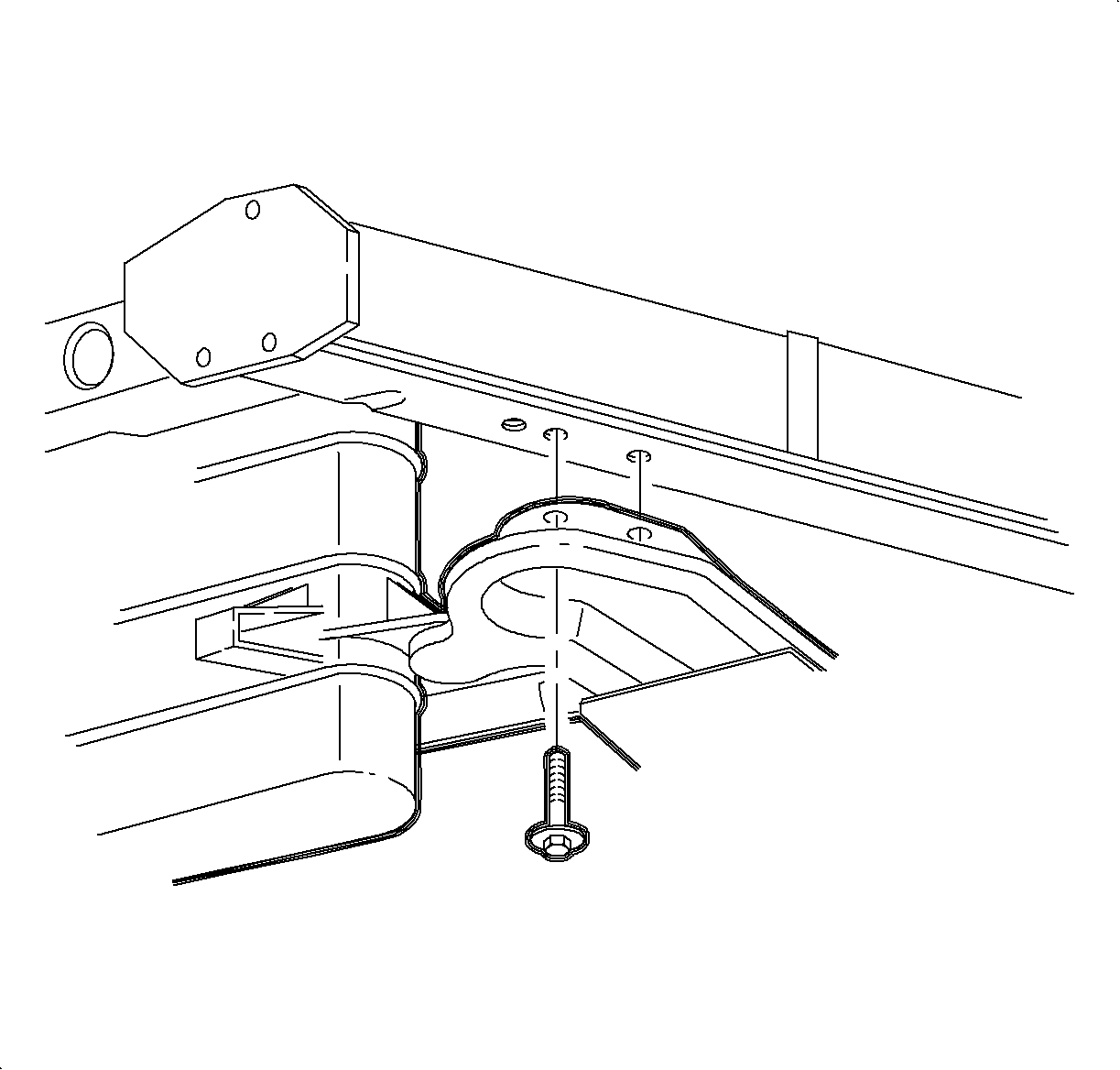
Important: Frame-to-body guide pins must be used to maintain proper alignment. Insert using 9/16 in. round steel rod for alignment pins. Alignment holes are at both front frame mounting locations. Mount studs must be guided into holes in frame as frame is installed.
Important: Do not tighten the fasteners at this time.
Tighten
Tighten the frame-to-body bolts to 210 N·m (155 lb ft).
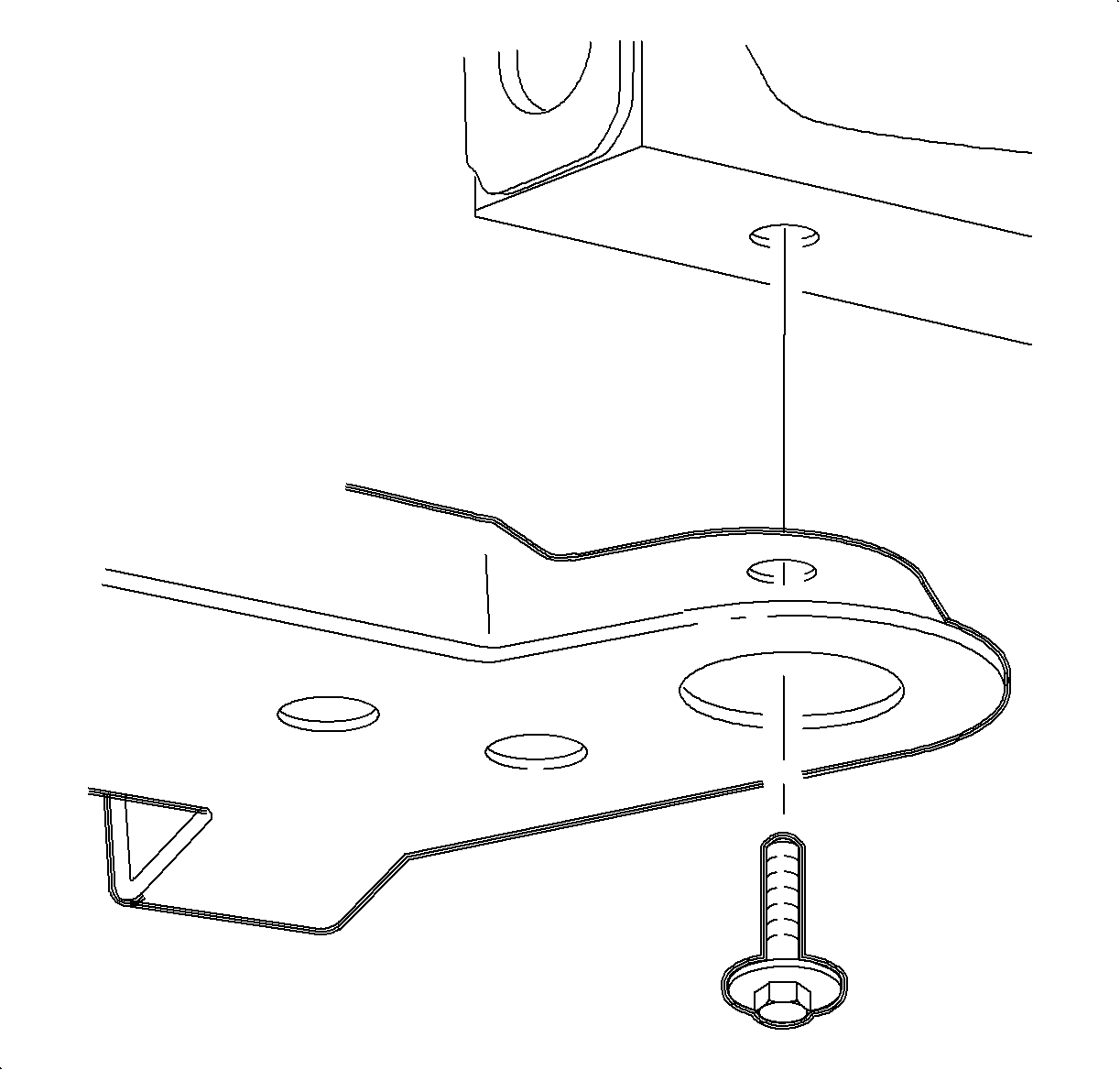
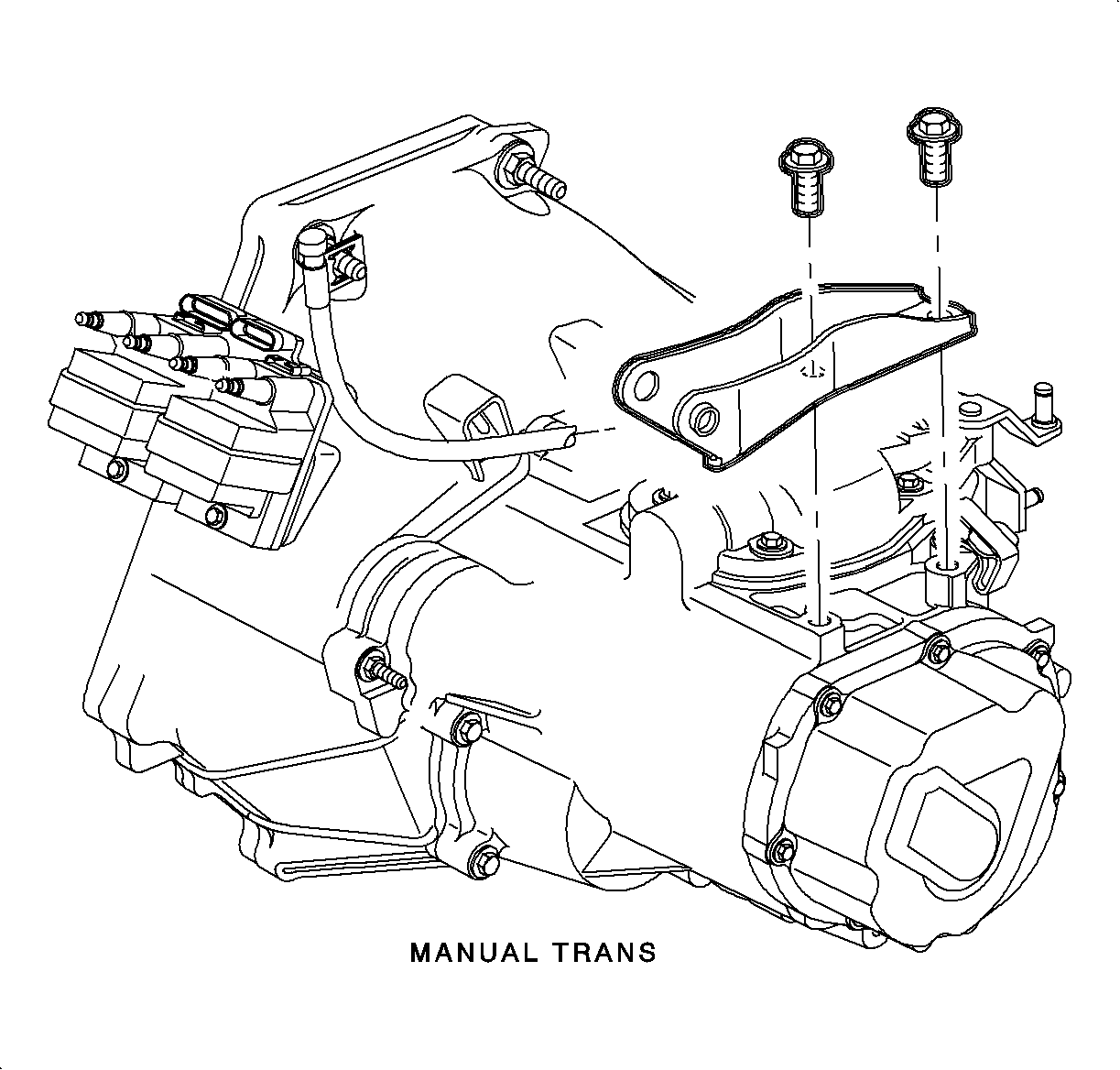
Tighten
Tighten the transaxle strut bracket-to-case bolts
to 54 N·m (40 lb ft).

Tighten
Tighten the transaxle strut-to-midrail bracket fastener
to 50 N·m (37 lb ft).
Tighten
Tighten the transaxle strut-to-transaxle bracket
bolt to 70 N·m (52 lb ft).
Important: Run a tap through ignition module mounting holes in transaxle to remove any thread sealant residue.
Tap size 6 x 1.0 mm.Notice: Use extreme care when installing the electronic ignition module bolts make sure the bolt head is seated on the electronic ignition module when the torque specification is reached. If the bolt head is not seated on the electronic ignition module, remove the bolt and tap the hole to clean any debris from the threads.
Tighten
Tighten the electronic ignition module and bolts
to 8 N·m (71 lb in).

Tighten
Tighten the transaxle-to-engine studs to 100 N·m (74 lb ft).
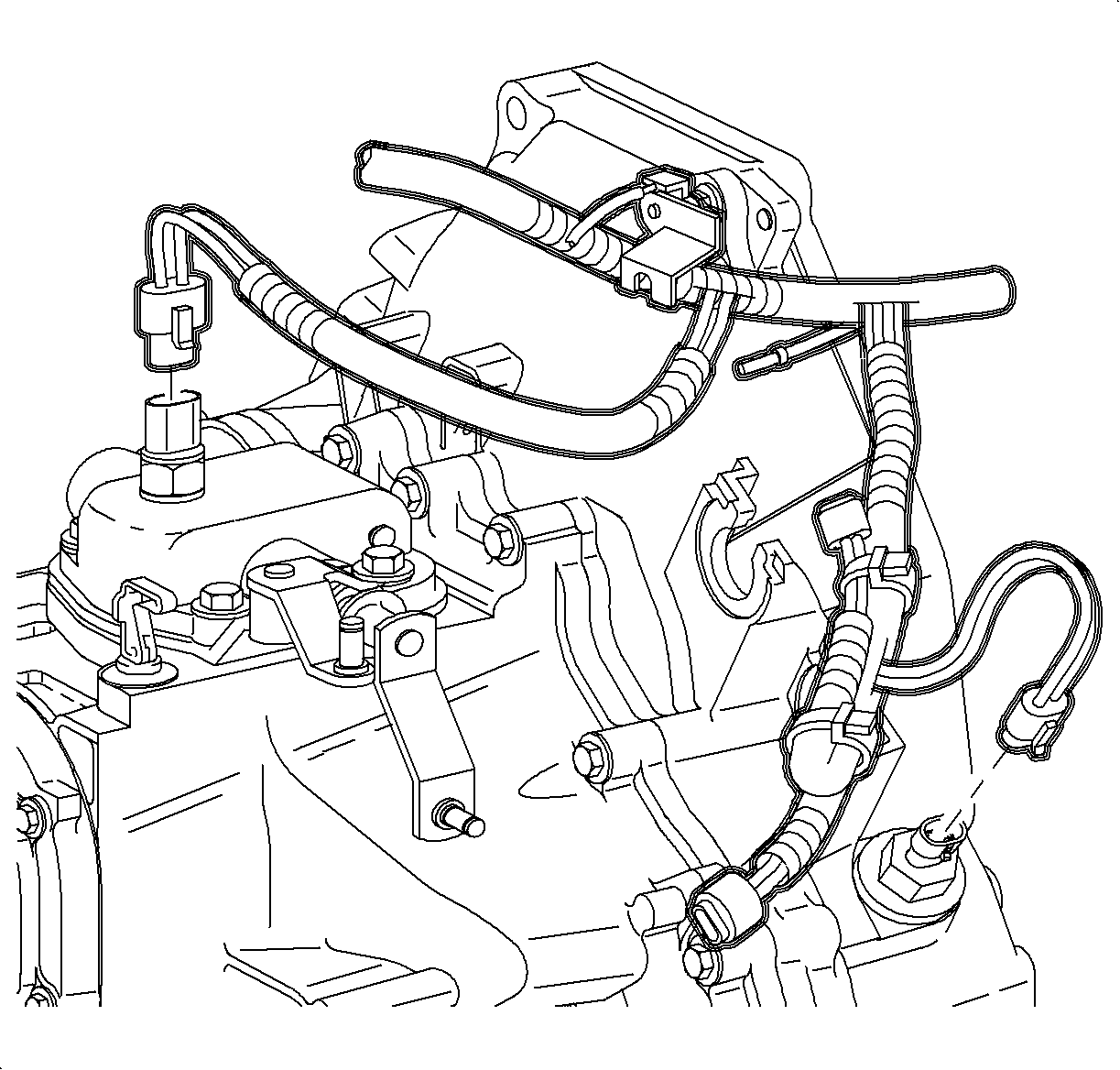
| • | The vehicle speed sensor |
| • | The back-up lamp switch |
| • | The 2 ground terminals to the top 2 clutch housing studs |
Tighten
Tighten the ground terminal-to-top clutch housing
studs to 25 N·m (18 lb ft).
| • | Install the vent hose clip to housing if equipped. |


Tighten
Tighten the clutch hydraulic damper bracket-to-case
studs at 25 N·m (18 lb ft).

Tighten
Tighten the battery tray-to-frame rail bolts to
10 N·m (89 lb in).
Tighten
Tighten the PCM-to-battery tray bolts at 6 N·m (53 lb in)

Tighten
Tighten the battery hold down-to-battery tray fasteners
to 9 N·m (80 lb in).


Caution: Ensure that the vehicle is properly supported and squarely positioned. To help avoid personal injury when a vehicle is on a hoist, provide additional support for the vehicle on the opposite end from which the components are being removed.
Tighten
Tighten the transaxle mount-to-frame nut to 50 N·m (37 lb ft).

Important: To ensure proper powertrain alignment, make sure that all other mounts have been torqued.
Tighten
Tighten the engine strut bracket-to-frame nuts to
50 N·m (37 lb ft).
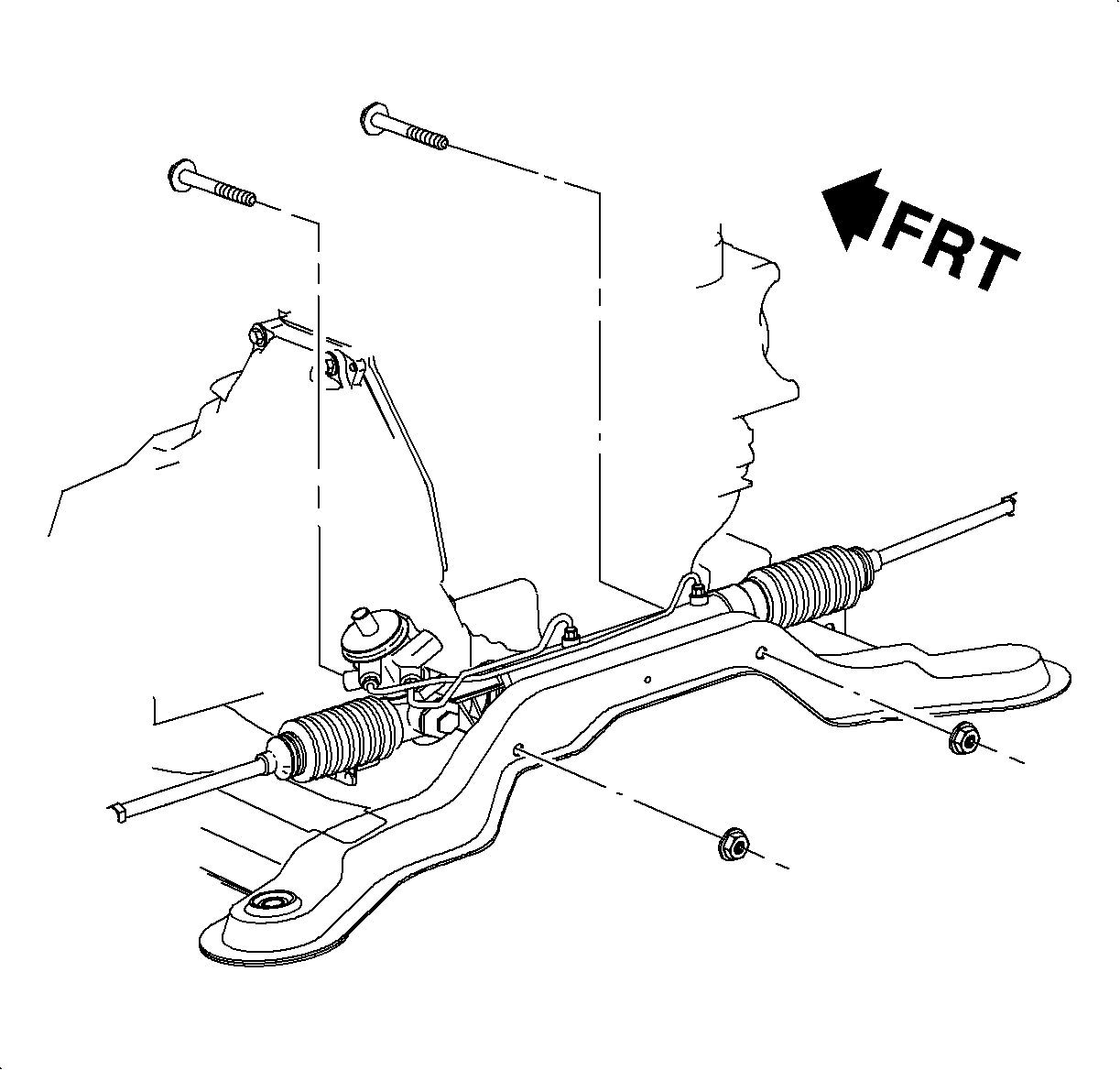
Tighten
Tighten the steering gear-to-frame bolt and nut
to 50 N·m (37 lb ft).


Tighten
Tighten the flywheel housing cover-to-clutch housing
bolts to 11 N·m (8 lb ft).

Tighten
Tighten the engine-to-transaxle stiffening brace
bolts 54 N·m (40 lb ft).

Tighten
Tighten the exhaust manifold pipe-to-exhaust manifold
nuts to 31 N·m (23 lb ft).

Tighten
Tighten the catalytic converter-to-intermediate
exhaust pipe nuts to 25 N·m (18 lb ft).
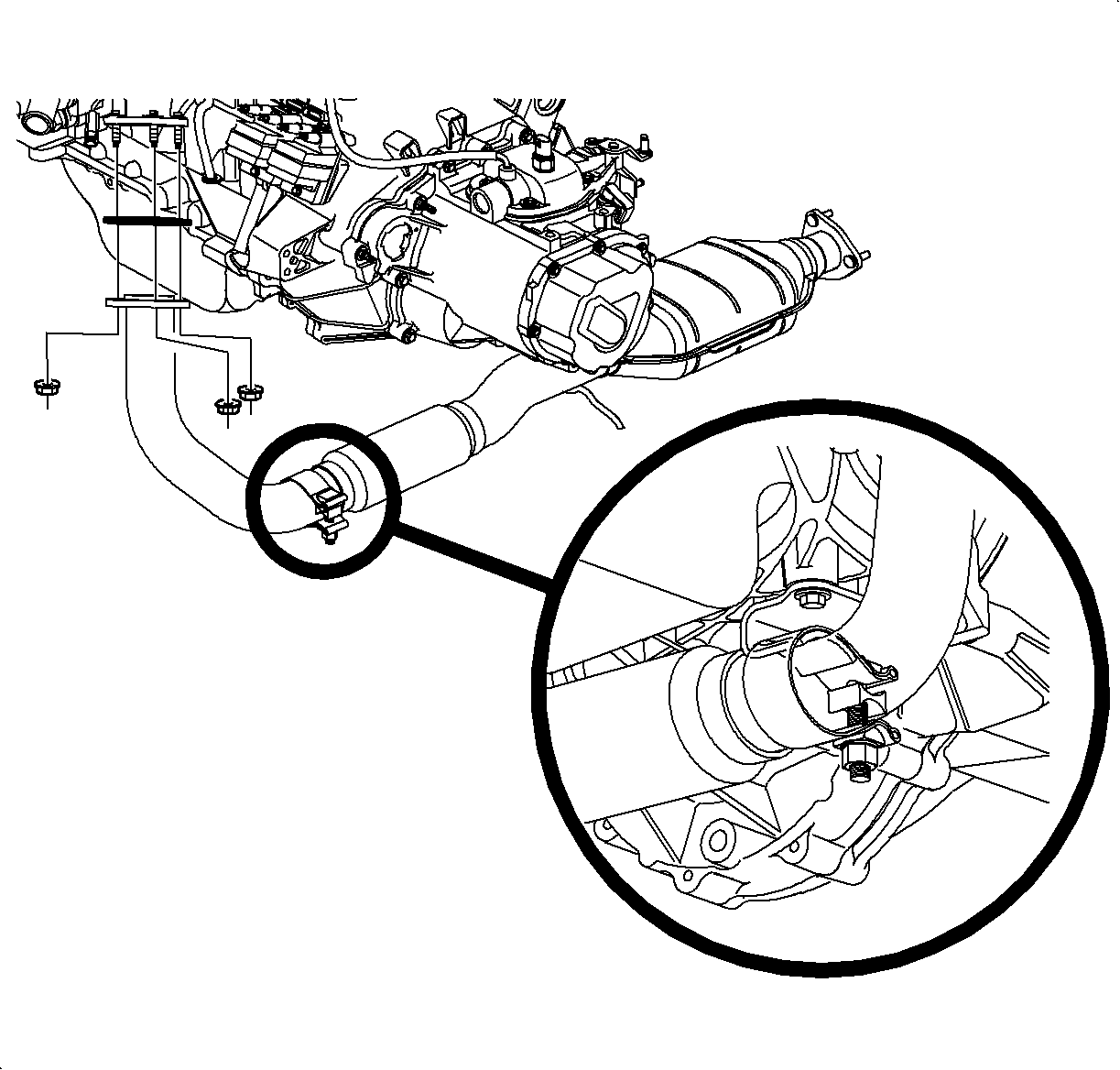
Tighten
Tighten the front exhaust pipe hanger-to-powertrain
stiffening brackets bolts 30 N·m (22 lb ft).
Tighten
Tighten the front exhaust pipe hanger strap clamp
to 60 N·m (44 lb ft).

Important: After torquing, if necessary, tighten nut additionally to align slot in the nut with the cotter pin hole in the ball joint. Install the cotter pin.
Tighten
Tighten the front lower control arm ball stud-to-steering
knuckle nut to 75 N·m (55 lb ft).

Tighten
Tighten the fascia support-to-frame fasteners to
10 N·m (89 lb in).
Notice: Before installing wheels, remove rust or corrosion from wheel mounting surfaces and brake rotors/drums. Failure to do so can cause wheel nuts to loosen in service.
Tighten
Tighten the wheel lug nuts, in crisscross pattern,
to 140 N·m (103 lb ft).
Tighten
Tighten the transaxle drain plug to 30 N·m (22 lb ft).
Important: Clean and lubricate fastener with Saturn Transaxle Fluid. Wipe off excess fluid and install.
Specification
Saturn Transaxle Fluid: 2.5 L (2.6 qt.)
Tighten
Tighten the battery terminal bolts to 17 N·m (13 lb ft).
Important: Attach the positive then negative terminal.
Tighten
Tighten the battery terminal bolts to 17 N·m (13 lb ft).
